#but that's an essay for another post
Text
why does no one ever talk about yamcha calling shenron bro in fighterz
like imagine going to god and going 'yo bro'
#dragon ball#yamcha#aldjkdjfjfjf like?? he's so silly#like i still have my gripes with fighterz always making fun of him for being weak#but that's an essay for another post#however there are somethings fighterz does good with him
23 notes
·
View notes
Note
I'm genuinely sorry, I was really tired and couldn't think of the word that mad pride movements use. I'm new to all of this. I thought you would be more open to it because you've reblogged from radical leftists (anarchists and communists both) within the past couple of weeks and they're all for Veganism afaik. The argument that all brains are different but equal and should be treated the exact same is a primary aspect of mad pride from my understanding, and that speaks to me about animals just having different brains, and that they don't deserve to be exploited and killed for us just because they're different. I'm not spamming people with it, but I was inspired by an ask by a nonvegan and started asking popular bloggers why they weren't vegan to open up conversation and potentially change people's views on animals. If I've made you uncomfortable I'm sorry, though I admit I'm really confused by your standpoint. You do know that the only reason communism hasn't succeeded is because of America? Anyway, sorry again, I'm also autistic and I didn't mean to dismiss your legitimate dietary needs. Can I recommend acti-vegan's posts? While I understand that you can't go vegan, perhaps their blog will at least help you understand our points, they're much more well-written than my asks and they have plenty of legitimate science resources at hand. Thanks for listening, I'll take your advice into account. I'm not trying to not listen, it's just frustrating because so many people say they get it but they don't change, and if they truly got it they would, you know?
Okay, I get that you didn't mean to be offensive, and fuck knows I shouldn't throw stones when it comes to forgetting specific words. (This happens to me fairly frequently; it's a thing.)
The argument that all brains are different but equal and should be treated the exact same is a primary aspect of mad pride from my understanding, and that speaks to me about animals just having different brains, and that they don't deserve to be exploited and killed for us just because they're different.
So yesterday I actually wrote out and then deleted a whole paragraph to the effect of "part of my deep, deep frustration with animal rights activism hooks into my commitment to the phrase 'nothing about us without us,' because I frequently see the same kinds of emotional projection without making the effort to listen to animals on their own terms from animal rights activism groups."
The first thing I need to make clear to you is that this--veganism and animal rights activism (ARA) more generally--is not new to me. I am in my mid-thirties and I have never had a job of any kind that did not revolve around animals in some way, I've spent time in rescue spaces and vets and universities, I'm queer and I have spent most of my life in leftish progressive circles, so it's kind of hard to miss.
Essentially, you are proselytizing to me as if you were a newly baptized evangelical convinced I had never heard of Jesus, because if only I had heard and understood his holy word, I would be converted instantly to his light! It's not any less irritating when the belief system isn't explicitly a religion.
More under the cut, because this one is long.
Disclaimer one: Veganism isn't synonymous with ARA ideology, but it's deeply entangled with it, and ARA ideology drives the movement of veganism as a (theoretically non-religious) ethical decision. And I object very strongly to the framework imposed by ARA activists. When I say I am not vegan, I am saying that I have considered the ethical framework that underpins veganism as an ethics movement and I have deliberately rejected it.
The second piece of context you should know that when I talk about being a behavioral ecologist, I mean that I'm a researcher who works on animals and that my framework is rooted in trying to understand animals in their own natural ecological context, without necessarily comparing them to humans. There's a lot of ways to study animal behavior you might run into, including attempts to understand universal principles of behavior that transcend species (animal cognition) and attempts to understand how to better treat animals in human care (animal welfare). You know Temple Grandin? Temple Grandin is an ethologist (the field that gave rise to behavioral ecology, also focused on animals within their species context) who worked on animal welfare (finding ways to make slaughterhouses less stressful to livestock, among other things).
Third point: my profession also means is that I work directly with animals--in my case, currently mice--and that I do not think research with animal subjects is wrong as long as all efforts are made to ensure maximal welfare and enrichment for the animals involved. This is another major bone of contention politically between my entire field and ARA groups, and you should know that I have also spent my entire professional career under the shadow of, well, people who care strongly enough about those ideas to invade my workspace and potentially seize my animals and "free" them into a world they do not have the tools to survive in.
So there's where I am coming from. Let's get back to what you're saying. Here, I'll quote again in case you have the same crappy short-term memory I do.
The argument that all brains are different but equal and should be treated the exact same is a primary aspect of mad pride from my understanding, and that speaks to me about animals just having different brains, and that they don't deserve to be exploited and killed for us just because they're different.
Point the first: Even within humans, I don't think that all brains should be treated the exact same. Especially in a disability context! After all, what is an accommodation if not an agreement to treat someone differently because they need certain things to access a space? Accommodations by definition fly in the face of this "treating everyone the same" understanding of fairness. I think all (human) brains are equally valuable, and I think all brains are worthy of respect, but I do not think that it's wise or kind of me to assert that everyone should be treated in the same way. For one thing, I teach students. If there's one thing teaching has taught me, it's that a good teacher is constantly assessing and adjusting their instruction to meet students where they're at, identify failures of understanding, and keep the attention of the classroom.
Point the second: animals do have different brains from humans. That does not mean that animals are inferior, but it does mean that they are alien. There's a philosophy paper, Nagel, What Does It Mean to Be a Bat, that you might find illuminating on this front. Essentially, the point of the paper is that animals have their own experiences and sensory umwelts that differ profoundly enough from humans' that we cannot know what it is like to be a different species without experiencing life as one, and therefore we must be terribly careful not to project our own realities onto theirs. That is, our imagination cannot tell us what a bat values and what it experiences. That is why we have to use careful evidence to understand what an animal is thinking, without relying on our ability to identify with and comprehend that animal. I have watched ARA groups deliberately encourage people to shut their reasoning brains off and emotionally identify themselves with animals without considering within-species context for twenty years. This is a mainstream tactic. It is not an isolated event and for that reason alone I would be opposed to them.
Point the third: there is a definite tendency in lots of people to care deeply and intensely about both animals and people who are seen as "lesser" in status--children, poor people, disabled people, etc--just as long as those groups never contradict the good feelings that come from the helper's own assessment of themselves and their actions. In humans, when the "needy" point out that some forms of help are actually harmful, the backlash is often swift and vicious. This is why animals are such an appealing target of support and intervention. They can't speak back and say "in fact, you are projecting my love of this frilly pink tutu onto me, and I think it's uncomfortable and prevents me from walking." They can't say "I kind of like it better when I don't have to worry about getting hit by a car, actually?"
(By the way: this is also why it's offensive to compare disabled people to animals, because this is generally done at least in part to silence the voices of disabled people speaking for our selves and our communities. We have access to language, and we use it, thank you.)
All forms of animal welfare intervention going right back to the founding of the first RSPCA have been incredibly prone to being hijacked by classist, racist, and otherwise bigoted impulses. This is because animals offer an innocent face for defense that conveniently cannot criticize the actions taken by their champions, and they therefore provide a great excuse for actions taken against marginalized members of human society. Think about the very first campaign the RSPCA ever did, which was banning using dogs as draft animals: a use that is not inherently harmful to dogs, which many dogs actively enjoy, but also one that was specifically used by poor Londoners and which in fact immediately resulted in a great butchery of the dogs that Londoners could no longer afford to feed rather than allowing poor people and their dogs to continue working together. No one was, of course, challenging the particular uses of dogs or any other animal favored by the wealthy. This kind of thing is so, so, so common. Obviously it doesn't mean that all interventions to prioritize animal welfare are inherently bigoted, but it does mean that we have to be critical about our choice of challenges.
On top of everything, the animal rights activist movement's obsession with "exploitation" is a function of the idea that humans are sinful or otherwise Bad in how we interact with animals by definition. For example, take the chicken rescue near me that is so obsessed with the possibility that some human somewhere might benefit from an animal in their care that they implant every hen they adopt out with hormonal implants such that the hens no longer lay eggs--a function that is normally a natural byproduct of a chicken's reproductive system, fertilized or not. A mutualistic relationship involves both parties benefiting, and that is the case for an awful lot of human relationships with animals. In general, the idea that associating with animals is a thing that can only harm animals rather than being a trade between two species to enrich one another is all over these groups. It's just so myopically focused on human shame that it prevents practical interventions that might benefit everyone, and often promotes interventions that don't directly benefit animals but sure do make humans miserable. For example, this kind of thinking is why groups like PETA are absolutely awful at effectively rescuing unwanted dogs and cats: they think pets living in "bondage" with humans are an essentially sad outcome, rather than one that might be mutually enjoyed by all parties.
I'm tired and my meds haven't kicked in, so I'm not currently going to handle the communism thing except to point out that while the US absolutely did destabilize a number of leftist regimes in South America and Africa, Russia and China between them have certainly not treated their own people kindly, either (and more so their own client-nations, as with the former members of the USSR). Please do some reading about the Holodomor and Lysenko in Russia (and frankly all of the details of Stalin's regime) and the Cultural Revolution in China in particular. Khmer Rouge might be worth looking into, too. I am not saying the US's hands are clean, you understand, because they are not; they're as steeped in red as anyone else's. What I am saying is that for people living on the ground, communist revolutions have this nasty habit of turning into bloodbaths and arbitrary slaughters. Do not let your distaste for the US's bloodsoaked imperialism (which, yes, is and was bad) let you fall into the trap of becoming a tankie.
And if you don't know what a tankie is, you really, really should take some time to learn.
#animal welfare#just#don't do this#when someone says “no”#please fucking listen#there's another essay in me somewhere on the painfully obvious sublimated dynamics picked up from Christianity all over this movement#but I do actually have work to do today including that ventral pallidum post I have been poking at
718 notes
·
View notes
Text
I'm sorry but the irony of Nico calling Max unprofessional is sending me so bad like sir there's an entire garage full of people, who were literally in the trenches trying to survive the Brocedes fallout while just doing their jobs, who might have a few things to say about your (& Lewis') level of professionalism at that time 😭✋️
#f1#formula 1#formula one#max verstappen#nico rosberg#lewis hamilton#brocedes#like niki lauda had to try multiple times to literally parent trap them to try and get them on speaking terms it never worked#because one would arrive they'd see the other and the other would leave#& if i remember correctly the garage crew would swap around from race to race as a like see we aren't favouring anybody gesture 😭#and thats no shade to nico because it was both of them contributing to that environment#his comment re max is just making me laugh#like if i was a part of the pr/media team - which is a part of the degree I'm working on irl - at merc that year i would've lost the plot#like its insane reflecting on it nearly a decade later but the poor souls just trying to do their job in the eye of that storm#truly gods strongest soldiers#ngl the professional comment irks me a bit because its not like max is engaging in inappropriate work place behaviour#he's engaging in another aspect of racing that his involvement raises awareness of & that makes racing more accessible#& we all know how inaccessible not only getting into racing is but also to continue to pursue the further along you go#theres so many stories of 1 sibling giving up racing so the other can keep going because the family can't afford for them both to race#its a huge financial strain & we only see a handful of drivers talk about that & try to do something to change it#and nicos fellow sky sports commentators are routinely unprofessional on so many levels#additionally max had a lot of valid reasons to be annoyed at his team today#but alas he's not english so he's ungrateful#i hate that drivers can't criticise their teams or car without immediately being branded as bratty & ungrateful#ESPECIALLY WHEN THEIR JOB IS TO GIVE FEEDBACK#you can see the double standards from sky when say Lando or George have complaints with their team/car v the likes of Max and Yuki#especially Yuki my god the things i would do to get the British media to leave him alone#this was a jokey post at one point and then became a rant whoops lmao#I'll leave it that before i write an actual essay here 😭✋️
514 notes
·
View notes
Text
Falmer appearance and attire headcanons
(click on drawings for more details and notes!)
Hair
In Skyrim, we pretty much only see two hair styles to go off of: completely bald and the hair the "shaman" have (which are also the only females we see (a post for another day)).
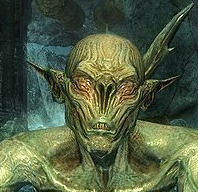
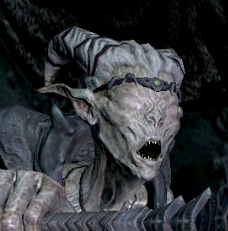
In concept art, particularly Adam Adamowicz's, we see more potential hairstyles. He draws it as wispy and messy, as well as containing braids and the ties we see in the shaman in the game. This art is largely what defines my own interpretation of their hair.
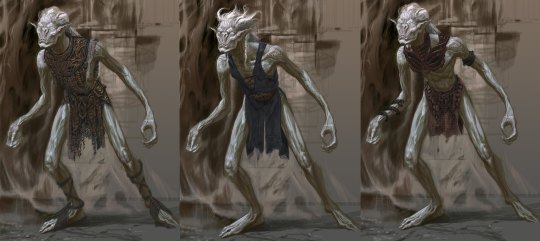

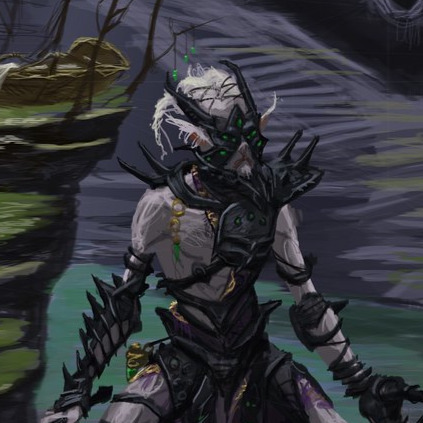
I picture the typical Falmer hair as wavy, thin, wispy, and looking frizzy. Given the high number of hairless Falmer we see, I imagine baldness is common, particularly among males, and sometimes among females. Their hair can be commonly styled into braids or knots to keep it under control.
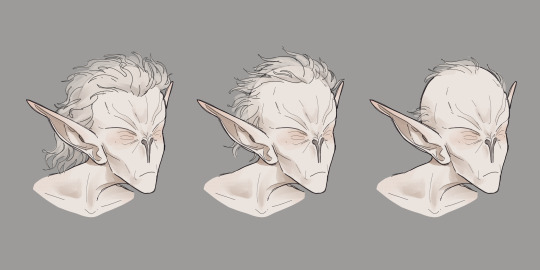
The ability to grow long, thick hair is less common, but those who can tend to style it in other unique ways. Especially among females, long hair is commonly styled into large dense locs (akin to a Polish plait) and held into shapes using ropes or leather ties.
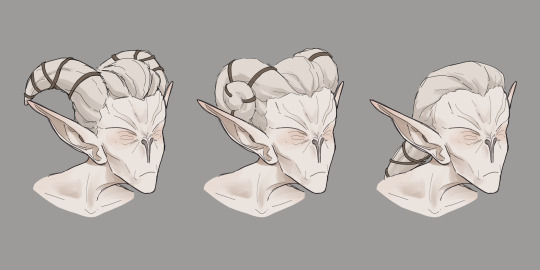
(While I think the intention with the way their hair is drawn and modelled in the game models and concept art was that it was braided and held up with those ties, before looking at it closely I always sorta interpreted it as too stiff to just be braided. As a result, I developed the locs headcanon and have become kinda attached to it even though I have 0 in game or lore support for it)
Materials
The material used in their clothing is obviously dependent on what is accessible to them, and given their unique situation that makes the materials they use and value unique as well. In Skyrim, we see that almost all of their armor (which is mostly what we see them wearing) and homes are made of chaurus chitin (and potentially shellbug chitin), so this is likely the most common resource available to them for non-combative coverings as well. Other materials from their arthropods companions could include their cocoons, unhatched eggs, etc.
Bones from other creatures (draugr, skeevers, trolls, adventurers, bandits, etc.) underground or from aboveground raids could also be used fairly often. These could also provide a source of leather or fur, albeit not a lot of it.
Falmer groups and subcultures inside or in close proximity to Dwemer ruins probably make regular use of the materials present in those ruins as well. With all the metal and machinery present in Dwemer ruins, metal probably makes regular appearances in their clothing (and general decorations) even if they can't manipulate it themselves. Falmer more separated from Dwemer ruins would make much lesser use of these materials, however. Additionally, We see implications of Falmer preparing, cooking, and potentially cultivating fungus in-game, but see nothing indicating they have any plants in their diet, and therefore it is unlikely they regularly make or use textiles or fabrics in their clothing, and if they do they likely come form Dwemer ruins or raided adventurers/bandits/settlements from the surface.
On that note, we know that there have supposedly been incidents of Falmer coming to the surface to attack its inhabitants and travelers, as well as instances of them killing bandits, adventurers, and researchers who venture below, so it's not far fetched to believe that they have access to some materials from the surface. This could give them some access to furs from surface animals, beads, glass, jewelry, textiles, metal objects, etc. they might not otherwise have access to. The rarity of these material among the Falmer would depend on the amount of access any given group of Falmer have to the surface, but among many of them these materials could be seen as more valuable for their rarity and the difficulty to gain them.
While gemstones and ore might be accessible from both natural deposits and underground ruins, unless they had some kind of auditory function or unique texture, they might not have much value to Falmer.
General Attire/Accessories
I like to imagine that the Snow Elves, and by extension the Falmer, have an innate cold resistance in the same way Nords do, and therefore don't require clothes for the purpose of warmth even in the chilly caves of Skyrim. Additionally, their blindness likely means that wouldn't dress for visual aesthetic either. My thoughts are that they are then left with the sense of sound and touch to communicate with each other, and their clothing and accessories could reflect that.
Falmer clothing, decoration, and society in general is very heavily based on touch and texture and little on appearances. They touch each other very often for both communication, movement, and just general day-to-day interactions, and their clothes isn’t very modest, but the tactile patterns and materials used can communicate certain things such as position in society, “wealth”/power, whether they are taken, single, pregnant, with a child, etc., their roles, their age, notable achievements/skills, who is who, etc. on both their clothes and buildings. The more noise one makes, the more attention they draw and the more they drown out other noises, and the more noise making things they can “afford” to have, so the amount of noise one makes in a Falmer settlement is a status symbol. Certain types of noises or noise makers are more coveted than others (chitin beads are common, while furs are less common, and materials only gained from raiding the surface are rare and coveted).
Some noise making accessories could include:
Dangling metal, bones, beads, chitin, etc. that hangs off of their clothing or ears and jingle/clank against each other (in my drawing I show them as pretty uniform in shape and size, but they would probably be much more irregular than I depicted them)
Bells (metal or other materials) that are affixed to or dangle off of their clothing or as earrings.
Hollow bracelets, anklets, necklaces, or other accessories that are filled with rocks or beads.
Rattles tied to the body (made of chitin, dried hollow chaurus eggs, dried chaurus cocoons, beads, etc.) with leather or rope.
Flute or whistle like tubes made of metal, chitin, or dried and treated tube-like fungus that makes a woodwind-esque noise when air passes through it in a certain way. They have been designed to make noise easily from even the slightest movements.
Dried grasses (more temporary) tied to the body that make a swishy noise. More permanently, a similar thing can be achieved with hair. The hair can be sourced from Falmer (either through just cutting hair or through taking it from fallen enemies) or killed humans/mer/draugr. That sort of thing can also act as a kind of trophy.
Necklaces with various materials dangling close together that jingle against each other.
Various materials can be tied into braids or the leather ties in their hair as well.
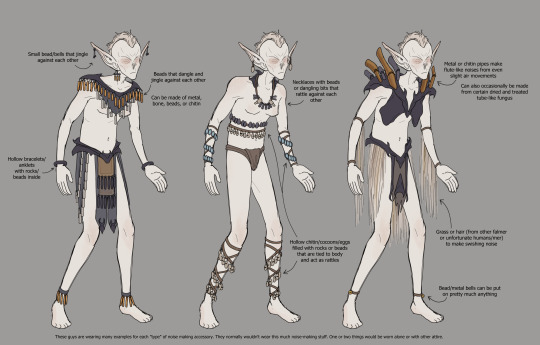
Some textural accessories could include:
Beads. Since they wouldn't have the ability to tell the color of the beads, the patterning of beadwork would be based on the roughness, material, size, or shape of the beads. (I'm sorry I suck as drawing beads)
Furs. This wouldn't be as common since the Falmer likely don't have too much interaction with furry mammals, but some they may have access to that are big enough to make clothing/accessories out of include skeevers or trolls (and potentially rarely animals from the surface). A potential meaning of wearing furs could be as hunting trophies, but it could have other meanings as well.
Chaurus chitin would like be the most common material in Falmer attire, and depending on the part of the chaurus body, the size of the chaurus, or the life stage of the chaurus it was sourced from it could have different textures. Some chitin parts could include large spikes and deep groves, while other parts could be smoother and less rough. The use of this chitin in clothing could take advantage of this contrast in textures. Additionally, chitin or shells from shell bugs might be a different texture from the chaurus chitin. (it's unclear to me whether shell bugs are exclusive to the caves around the Forgotten Vale or if we should consider them distributed throughout Skyrim's underground)
The placement of textured components on the body could have their own meaning to it alongside what accessories or textures are being used.
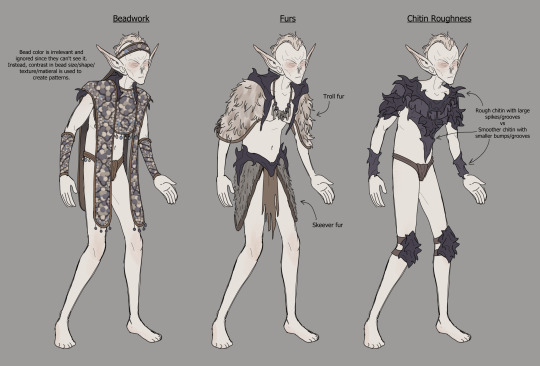
Specific Falmer Subcultures
While most Falmer settlements we see in Skyrim are just a small-ish collection of huts and chaurus corrals, there are two distinctive settlements that are larger, seemingly more organized, and I like to think have their own distinct subcultures worth mentioning: Blackreach and the Forgotten Vale. The unique scope and environment of these Falmer cities (as I like to think of them) could lend to unique clothing cultures as well.
The Falmer of Blackreach have access to a vast Dwemer settlement and have has the space to spread out throughout it more fully since it seems to be more in tact than other Dwemer ruins we see. These guys would likely have a clothing culture much more heavily based on what the can access from these Dwemer ruins (metal scraps, leftover fabrics, etc.)
The Falmer of the Forgotten Vale would also have access to unique resources, such as Vale deer, Vale sabre cats, and frost giants for fur and leather. Additionally, materials accessed from the Chantry of Auri-El such as textiles from clothing, bedding, tapestries, etc. could give them a greater access to fabrics than other Falmer groups. We don't see many close Dwemer settlements to the Vale, so they would have less Dwemeri influence in their clothing than other Falmer groups.
I like to think that the Falmer's evolution exclusively underground has made them poorly equipped to handle the outdoors during the day and has made them particularly susceptible to sunburn, necessitating the need for covering for those in the Forgotten Vale who have significant settlements outdoors. With greater access to textiles and leather, they could use them as coverings when outdoors.
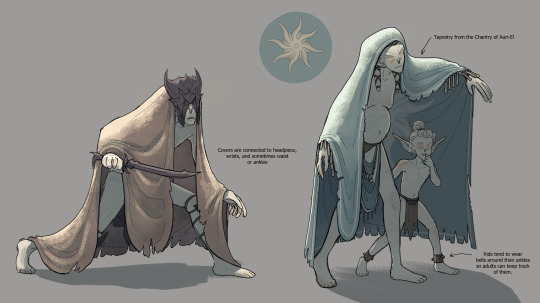
Armor
I actually have very few notes on armor, for two reasons. 1) I hate designing and drawing armor. It is the bane of my existence. 2) I really like the armor they have in game! I think they look awesome aesthetically, and I like how clearly they are made from chaurus chitin. Per usual, Adam Adamowicz's designs seem to have been the major inspiration for the Falmer armor, and he did a great jobs (even if it isn't the most functional looking armor ever).
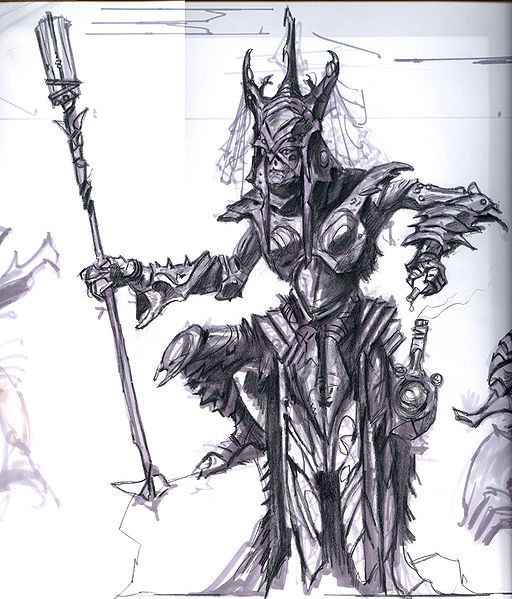
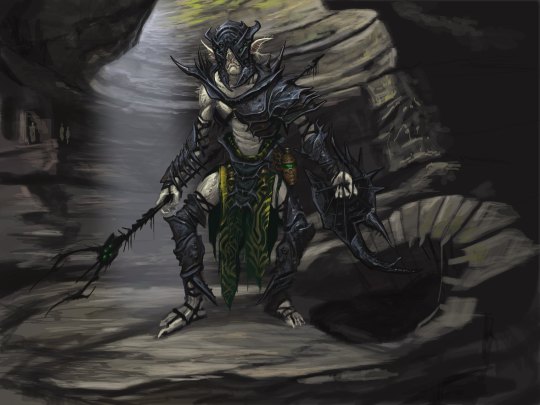
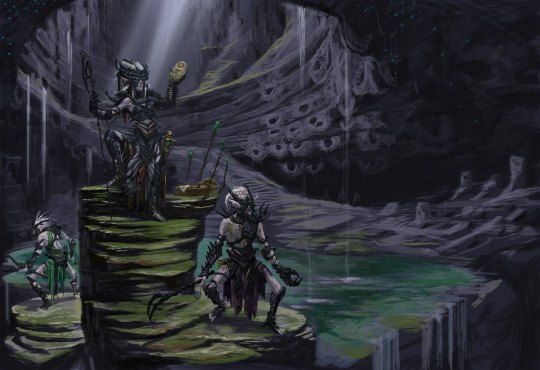
(off topic but I also just want to add that he draws them with little hairs and tufts on their ears and I love it. ok that is all)
I do have a few thoughts about armor though.
Even attire made of textiles make noise when someone moves in them, and I can imagine moving around in armor, especially armor made of hard, insect shells would make a lot of noise when someone moves around in it. When you're relying on sound to navigate your environment and pinpoint potential threats or targets, wearing something making a lot of noise would not be ideal. On the other hand, getting into a fight unarmored would be a problem.
So here's my solution: heavy armor (see below) would only be worm within the camps/settlements where noise was already high and space is more cramped (and therefore more risky in a fight) as a sort of guard in case they were attacked. Those guarding the settlements along the outside might still wear armor as well, but less of it. Those going out to scout or hunt (if they do hunt) would wear as little armor as possible, and try to wear it strategically so that it wouldn't rub against itself and make noise. This is why most Falmer we encounter in the game are wearing little except for loin cloths and kneepads.
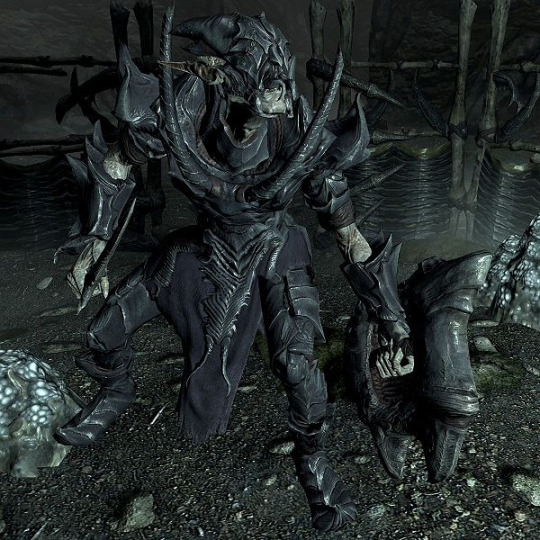
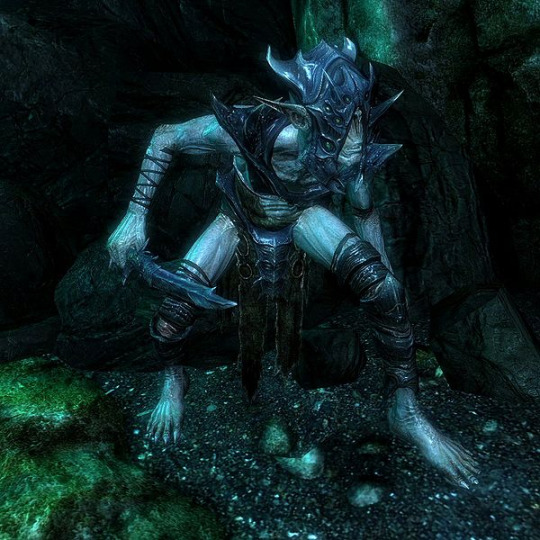
One more idea I have for armor is a specific armor piece. On the note of guarding or protecting a camp or settlement, I imagine the noises of it all (especially with the noise based headcanons I've laid out here) would make it hard to actually catch any potential threats when you can't see. A large slightly concave piece of armor worn behind the head could block out noises from behind the wearer, as well as a help focus sounds ahead of them.
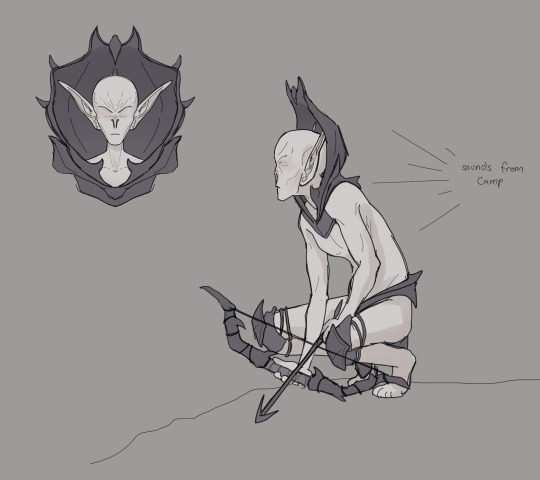
That is all! Thank you for reading! A lot of these concepts around the culture of sound I think could also be applied to their buildings and even a culture of music, but those are posts for another time.
All of the concept art I used was taken from here and all of the Skyrim screenshots are from UESP.
#skyrim#tes#the elder scrolls#falmer#skyrim headcanon#tes headcanons#headcanon#sorry this is long (but not really)#i just cant express my thoughts like a normal person. college conditioned me to format everything like an essay where i have to provide#sources and shit lol#also im kinda autistic about falmer#i appreciate those of you who read it all!#mine#adam's concept art makes me feel very validated in my echolocation headcanon because its very obvious he references bats in their face#which is another post idea i have for another day#my art
921 notes
·
View notes
Text
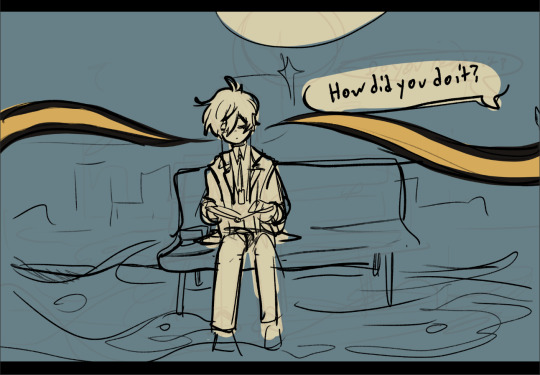
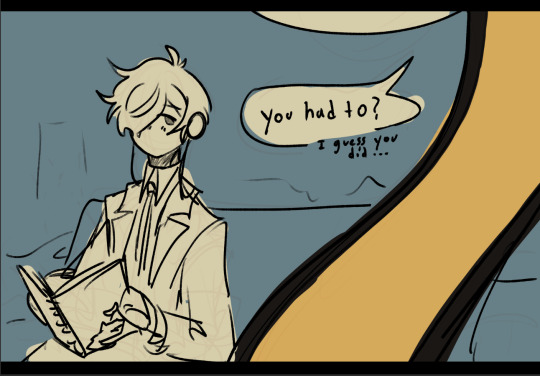
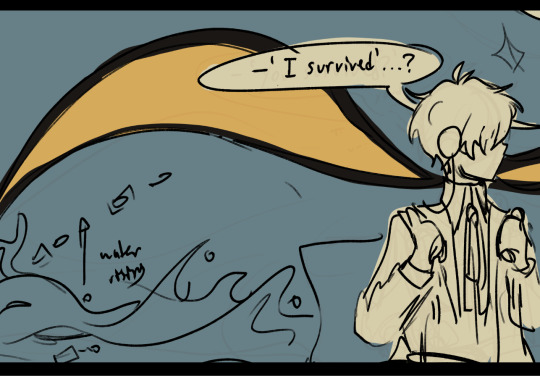

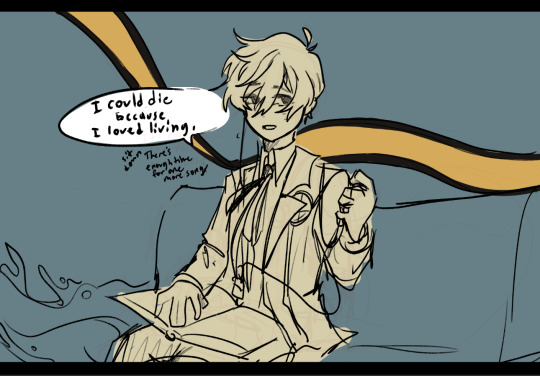
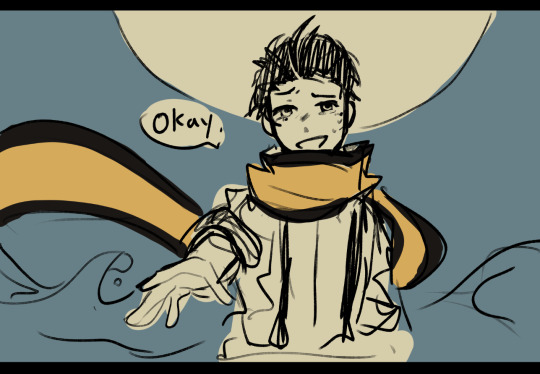
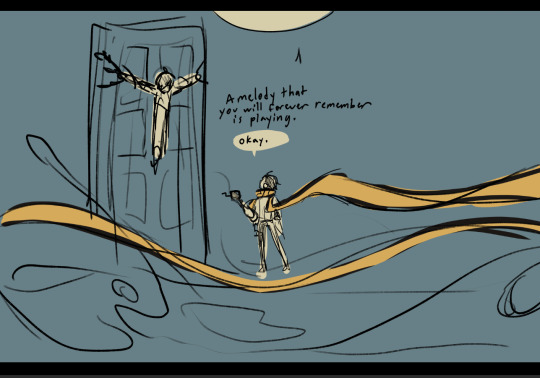

you ship ryomina because ryoji is a disaster of a bisexual. I ship ryomina because of the beauty of a suicidal boy that can love life enough that death can agree.
#I didn't have the strength to properly draw this out#maybe another day#but I really wanted to post it.#Ryomina#ryoji mochizuki#minato arisato#persona 3 spoilers#persona 3 reload#I have a whole essay I've written in my head since like#high school about how much persona 3 is a game about loving life first and foremost#alas no one would listen to me if i wrote it out so here we go#oomfs who are still leeching off my reload look away
972 notes
·
View notes
Text
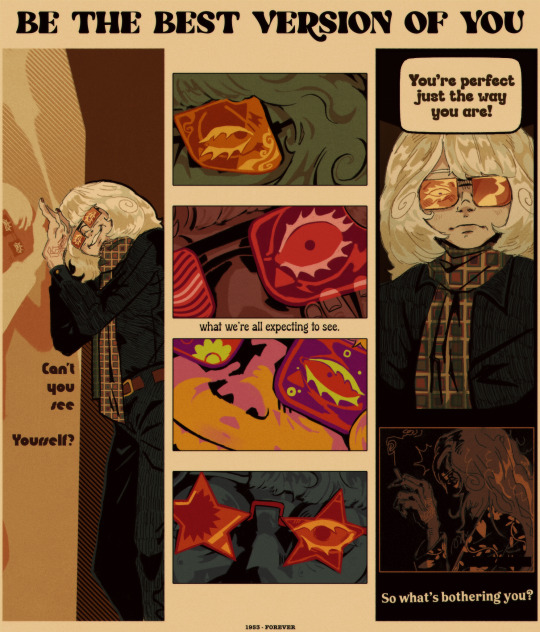
never change, man !
#phantom of the paradise#potp#swan potp#nightmaretheater#65 layers and about 24 hours . Eeeyyuppp#Look into my beautiful mind boy#Its a bit unusual to what i usually draw#but i had to push a specific look for this piece#hopefully you all are picking up on the corperate look . the advertisment look#Sneeze. Anyways my point is industry destroys creative people. This includes swan#I feel like phrases like these ; how he was put on a pedistal…. it lead him to be Like That#as awful as he is he desperately needed help#it might seem like vanity on the surface#but i think its… more than that#long story short: we need to destroy the beauty industry. the skincare industry. the anti-aging industry#It ruined his psyche forever and he cant let go of the ideal version of himself he will never truly be again#i dont think he can at this point. hes in too deep and hes suffering for it no matter how much he feels hes fixed his problems#he cant accept a version of himself that isnt that perfect young man. because he never confronted his problems. he just ran away#anyways . Hi swath *punches him**kicks him*#i dont care if nobody gets me lalalalla my truths and headcanons are awesome forever and i live in my own reality lallaallal#sorry i think im gonna be posting about swan alot for a few months hes making me sick#i wass gonna post this earlier but my internet was real bad#*lays down in my pile of pillows* eat up boys. haha#sidenote: drawing white blond people is horrifiying. Boy your skin and hair are the same color. Introduce some contrast to yourself. Please#adding on: its inportant to note this focuses on him looking st himself in the mirror alot on purpouse#to remind himself what he ‘’’’really’’’’ looks like#the 4 middle pannels all represent that too . u have to be in my brain ri get this#sorry for unleashijg another swan essay in my tags. will happen again lol
508 notes
·
View notes
Text
Ideology of Exceptionalism and Gravity Falls; meta and character analysis

I had a whole ago read a post by @icanlife that had a quote by Alex Hirsch on Ford's greatest flaw, and wanted to explore what the flaw is, which is the ideology of exceptionalism; in the exploration, I’ll touch on what it is and how it is used in abusive relationships and cults, as well as how it drives multiple Gravity Falls characters and consequently how it impacts relationships between these characters, and how the show ultimately refutes exceptionalism.
Quick note here; I am not in any way, shape or form a psychologist nor have any formal training in psychology; this is written from my own experiences with this ideology and my own forays into psychology and trauma-informed learning. It is also written with a loose understanding that is likely not broad enough to cover all references to cults, extremist groups and abusive relationships.
The Ideology of Exceptionalism
First of all, we have to get through a drier bit, which is… what is the ideology of exceptionalism and how does it arise? Might be fairly obvious, but it is the belief that you are, or belong to, a group of exceptional people, thus more important and worth more than anyone else; ie, those who don't qualify as 'exceptional'. It is often a subconsciously learned ideology. Now, what qualifies one as exceptional can be extremely varied; generally it revolves around something that provides some form of privilege. Thus, it might be, as the main exceptionalist idea in Gravity Falls, 'intelligence', or power, or it can be such things as attractiveness, quantity of money one has, species, nationality, or skin colour and ancestral heritage. The ideology of exceptionalism, being by nature hierarchical, devalues, and at its worst, openly and violently dehumanizes those who do not qualify as exceptional.
For why exceptionalism occurs is an extremely broad topic, but I've personally found that, for exceptionalism revolving around intelligence, it's a result of a poor sense of self-worth, and having one's self-worth tied to what makes one exceptional. Poor self-worth itself (again, broadly) is a result of childhood trauma from a lack of positive affirmation and unfulfillment of the emotional needs of the child. Meanwhile, self-worth becoming tied to the quality of exceptionalism generally is a result of when positive affirmation was pretty much solely provided around their 'exceptionalism', especially when provided derogatory commentary, or a blatant example of how they would be treated if they aren't 'exceptional'. As a result of the general lack of affirmation, self-worth then becomes often solely reliant on the qualities of exceptionalism, as that is the only way for the child (and later, adult) to get affirmation of their worth, as well as out of fear of being ‘not worth anything’ like the examples of ‘non-exceptional’ people they have been given.
This is especially likely to occur when the child is a social outcast; the adoption of the hierarchical ideology of exceptionalism, and the devaluation/dehumanization of others often occurs subconsciously as an avoidance/minimization tactic from pain. This is to say, the child, and later the adult (if healthy self-worth is not established) goes 'it doesn't matter what the non-exceptional people say or if they accept me since I matter more than them because of my exceptionality'. It can even be taken further, that being shunned is part of one's exceptionalism, and becomes part of the qualifier of being exceptional. For instance, 'they just can't understand because they aren't exceptional and that's just a part of being exceptional'. This idea also neatly tailors into the part of the concept of being better then others means you are separate from others; this can be taken that someone who is special, needs to be alone to be truly special.
Obviously, exceptionalism is not a healthy coping mechanism for poor self-worth, as often such people constantly feel the need to prove and show off their exceptionalism to gain that affirmation and avoid rejection, which is stressful. As well, it often negatively impacts their relationships with other people as a result of the arrogance of believing that they are better than most others, or even deliberate sabotage due to their arrogance. This occurs as they flatten the complexity of human experience to black-and-white hierarchical categories of exceptional/not-exceptional through constant judgement of those they meet, and often refuse to engage with people who don't belong to their 'exceptionality', or even people they simply don't like, even if they technically qualify. Generally, those that they do like or have close relationships with, often due to being similar, are automatically labelled as 'exceptional'. Those judged as ‘exceptional’ also become privy to the open judgements of ‘non-exceptional’ others, out of a subconscious belief by the exceptionalist that the other believes similarly; something that may strain their relationship if the other doesn’t ascribe to exceptionalism. This all culminates in the exceptionalist being blind or even adverse to the diversity of experiences, which makes it difficult to create relationships and community outside of echo chambers of their own beliefs (if they can even find this), and subsequently, these people are often isolated and have very few to no close relationships with people.
However, all humans require connections with other people, relationships where one can rely on others emotionally and physically if needed and feel accepted; they also require to feel like they are worth something, that their life has meaning. Lacking meaningful connections and having a crippled sense of self-worth, a deep yearning hole is left in these people. Exceptionalism, especially as it is a narrative constantly pushed by Western society as it validates hierarchies, is then employed as a (often subconscious) trauma response to assuage this yearning hole, with arrogance and denial. And depending on the circumstances, it can be a very strong and definitive trauma response for people.
This isolation and lack of self-worth is catnip to abusive relationships, including cults and extremist groups. These types of relationships often heavily rely on isolating their victims or pulling them into echo chambers of solely the abuser’s rhetoric, to redefine what is healthy through gaslighting; as the exceptionalists are already isolated, this makes them extremely susceptible. They also often provide these people affirmation, and in these cases especially about their exceptionalism, thus confirming their self-worth, their 'specialness', while also providing them the connection they have been lacking, either through the cult community or through the abuser’s own presence. These emotional needs, which haven’t been met in a long time, if ever, begin to be fulfilled; something that abusive relationships and cults hinge on, rather than any form of logic.
Ideology of Exceptionalism and Gravity Falls
The main characters within Gravity Falls which are heavily ascribed to exceptionalism would be both Ford and Bill; this characterization deeply impacts the story and their relationships with others (technically the Northwest are another case regarding wealth, but less directly impact the storyline and thus tangential; Gideon also is an example, but as a mirror of Bill). With each of these characters I’ll go into detail within their sections on the way they began to ascribe to exceptionalism, and how it plays out later in their relationships; I will first begin with Ford, then move to Bill. Then, to cap it off, I’ll go into the characterization of Stan and the way Gravity Falls refutes exceptionalism.
Ford and Exceptionalism
Firstly, the quote from Alex Hirsch that kicked this whole baby off, as mentioned previously;
“Ford sees Dipper as someone who’s special like himself. That’s Ford’s great flaw, his arrogance is he believes that there’s special people, and everyone else. That human attachments are actually weaknesses. And the song and dance that he’s giving Dipper right now, is the song and dance that he gave McGucket, back when they were younger… ‘You and me are different, we’re better than everyone else. We have a path that no one else can understand, and only us can do this.’ It’s a very seductive idea for Dipper… Dipper is a smart kid, but Ford’s projecting. Ford loves Dipper because he sees someone who’ll tell him ‘yes’ to everything. Who’ll never challenge him, who’ll do a really insane dangerous mission.”
Very blatantly Alex Hirsch calls Ford out on his arrogance in the belief that he is special, in his belief in the 'lone hero' complex, in his belief in exceptionalism. And really, it should be no surprise that Ford does so, considering the way he's depicted as a social outcast as a child (other than Stan), and the way his parents have been clearly shown to be not particularly emotionally supportive (“I’m not impressed”); they don't provide positive affirmation except for his intelligence (mostly due to the possibility of money making through it…), while also actively comparing him to Stan who is derogatorily ‘not-exceptional’, and ‘worth less’. This all sets Ford’s self-worth up to be fragile, and other than Stan who wholeheartedly accepts him, he is isolated and invalidated; plus, the only other validation he receives is around his intelligence. All very classically fitting the profile for exceptionalism.

Image id: Stand and Ford when they were children, both clearly enjoying each other's company.
Ford’s belief in his exceptionalism catalyzes after the shattering of his and Stan’s relationship. Previously the twins are shown to do everything together, having a very close caring relationship; something unlikely if Ford thought he was better than Stan. Also, when Ford is talked to about his opportunities, Ford looks uncomfortable at the way they talk about Stan as inferior, compared to how he himself is being praised; but in the offer he’s simultaneously finally being validated, he’s being told he’s someone worth something, and he’s going to be someone worth something after this. And then the science fair incident occurs, and Ford loses that validation from his parents, from the judges and a future of more validation; after being promised validation and acceptance, it slips through his fingers. And in his anger of being denied that, it becomes easy to begin to slip subconsciously into the rhetoric the others have been feeding him; that he’s exceptional, that Stan isn’t, and he deserved to be recognized for his worth. So he breaks the relationship with the only person who accepted and validated him for who he is. With that loss of previous support, Ford becomes then deeply obsessed with proving his exceptionalism to the world to assuage that fragile self-worth, to become accepted, or even better, revered, confirming that he is someone of worth, someone special, like he was promised.
Ford’s obsession also doubly functions as a way to alleviate his guilt over shattering their relationship; if he’s exceptional as he believes, then he’s within the right to respond the way he did, as he’s worth more than Stan, he's better off alone, and he has a right to be angry over being denied that validation. As well, in much the same way as it is used as a way to alleviate his guilt over the end of their relationship, it is also likely used in a way to minimize the pain of being ostracized (although not directly depicted); afterall, Ford’s keenly aware and insecure about his social ineptitude and his six fingers as things that make him different from other people, case in point with his experience visiting Lazy Susans Diner. Thus it wouldn’t be unsurprising if he uses the idea of being worth more than those who ostracize him to imply it ‘doesn’t matter’ what they think. His ostracization by nature keeps him from generally forming close relationships, with the exception of Fiddleford (who much like him, is socially outcast, and intelligent) during his university days. As a result, he's isolated and acutely lonely, having lost Stan.

Image id: One of the missing Journal 3 pages in TBOB, detailing Ford's botched social interaction in Lazy Susans Diner. In the background is the print of his six-fingered hand.
In his obsession over being acknowledged, Ford, like many others who believe in exceptionalism, identifies strongly with the causes of his ostracization (his intelligence, his six-fingeredness) as part of, or wholly, makes him exceptional. It is obvious through his choice of study; with the grant he has been gifted, he chooses to revolve his work around the weird, the outcast, something that you see Ford gravitate towards being an outcast and deemed 'weird' himself (which in Journal 3 he openly talks about). Something that can be, much like him, framed as 'exceptional'. His work is even recorded in a journal that Ford deliberately chooses to put his six-fingered hand on the cover of. Intertwined with the way it becomes adopted into the idea of exceptionalism, is the keen loneliness from his ostracization and a deep desire to be accepted and a wish to find a community of other weird people.

Image id: Two pages from journal 3, labelled 'Myself', in which Ford is open about being weird, and a social outcast, while also noting his ambitions and that 'Gravity Falls, [is] the place that I fit in.'
Ford and Bill
All of this culminates in Ford becoming an incredibly easy target to manipulate by Bill. He’s desperate to be acknowledged (and thus accepted) by an authority figure so that his belief in exceptionalism is justified and his self-worth confirmed. And he knows he’s intelligent, that he's exceptional because people have told him so, but he just needs to prove it with something that shakes the world. And the grant is finally his second chance after the fair, but he's stuck, and the research is going nowhere, and he's in a town where he doesn't really know anyone and he’s so terribly lonely. And sure, he clings to his exceptionalism but if he can't even prove it then is he really exceptional? Is he even worth anything like he thought he was? And what about what he's left behind, rejected, because of his exceptionalism?
And THEN he finds an incantation and he ignores the warnings because maybe, just maybe, this will be his break to get that acceptance/validation he has been chasing his whole life?
And then it's better than that.
A god, essentially, shows himself to him, an ultimate figure of authority. And he tells him that yes, he is special, he’s worth more than other people, and Bill’s only showing himself to Ford because he is so much more intelligent than anyone else. Ford is suddenly getting his exceptionalism confirmed by a god of ancient knowledge, an immensely intelligent interdimensional being, and he’s also showering him with affirmations, specifically affirmations around what Ford's fragile self-worth is based on. And even better, he's delighted by Ford's six-fingeredness; he's not put off at all, it even becomes his main nickname for Ford, just like it used to be for Stan all those years ago. On top of it all, Ford's own social ineptitude doesn't phase Bill, another thing Ford is self-conscious about; Bill's own social ineptitude as he's not human probably makes Ford feel comfortable, knowing that's not expected from him.
Through Bill, not only does Ford find someone who validates his self-worth through intelligence and even confirms to him that his weirdness is part and parcel of making him special, he also finds someone who he regularly (generally) is in contact with, who enjoys talking to him and even banters with him familiarly. Hell, Bill even deliberately goes out of his way (literally possessing a whole wack ton of rats, then dream karaoke) to celebrate his birthday with him; how long do you think Ford has simply skipped his birthday since he had no one to really celebrate it with? The loneliness, beneath his arrogance and belief in exceptionalism, is being fulfilled; for the first time since Ford was a teenager, he's fully accepted by someone, social awkwardness, six fingers, exceptionalism and all.

Image id: One of the lost pages from Journal 3 in TBOB, the 'one thing led to another' page, with Bill and Ford singing karaoke and drinking together, both clearly enjoying themselves; Bill has an arm slung around Ford's shoulders.
So it's really no surprise at all that Ford fell for this, hook line and sinker. Hell, if I was in Ford's shoes I would fall for it just as hard. And I've seen a few posts floating around talking about how Bill is bad at manipulating, and no, he's not. He was able to pinpoint exactly what Ford wanted and needed, and provided that, was charismatic enough to provide that. Again, manipulation isn't about logic. It really isn't; it's about the emotional core in people, what people lack and what you can give them to slowly reel them in to sing your dance and song. And people will ignore vast swaths of red flags when you're finally being accepted, when you're finally getting your emotional needs met at least in some way or form. It's better than not having them met at all, such as previously. So Ford worshipping Bill is really not a surprise, especially as Bill deliberately stoked it.
All of this is part of why you see Alex Hirsch call Ford's belief in his exceptionalism his greatest flaw; because it allowed him to be very easily manipulated by Bill, and by its nature kept Ford isolated from others, evident by his arrogance in assuming he knows best and refusing to see other people who aren't as 'intelligent/weird' as him as worth getting to know, listen too and even reach out to ask help from, it's him believing he has to be the lone hero as someone whose 'special'. It's something that blinds him to the danger of his work around the weirdness of gravity falls because he’s desperate to seek a place where he and his weirdness belong, and it's something that plays out in each and every relationship he has because it's something he clings to so deeply. It's what cost him his relationship with Stan, who previously accepted him completely, and, as he's disinclined to form new relationships and as Bill actively strokes his paranoia (Trust No One…), ultimately further increases the hold Bill has over him. It's only Fiddleford’s presence as he works with Ford that allows him some form of outside reference and reprieve from solely Bill’s influence, something that Bill resents deeply and is clearly jealous and angry about, even if Fiddleford is helping create the portal. And it's ultimately Fiddleford, once he was aware enough of what was happening, calls Ford out on it, seriously jeopardizing Bill's influence over Ford; but Ford is too invested in the portal, in chasing his own ambition and caught up in Bill’s manipulation to take him seriously, until the incident with the trial, and Ford beginning to hear other voices then Bill.
Ford’s Exceptionalism and Wider Relationships
Now back to how it plays out in all Ford's relationships; we've already gone over it with Bill's influence, because it made him extremely easy to manipulate, and with his disregard of Stan in favor of validation of his exceptionalism. But Ford, as pointed out by Alex Hirsch, also exerts the ideology's seductive rhetoric to both Fiddleford and Dipper (who look up to Ford) in a similar way that Bill does with him (although there is a difference of it being used intentionally and maliciously, compared to subconsciously and earnestly, even if it is problematic). Ford, with his black-and-white view of exceptionalism, sees both Fiddleford and Dipper as people who are like him; 'exceptional', and so he treats them as such, and uses this rhetoric to coerce them into helping him.
For Fiddleford, the lure is how he can change the world, how he can be finally acknowledged if he helps Ford with the portal. And it works well; he willingly chooses to leave his own work and his wife and young son, to work with Ford. Much like Ford, Fiddleford himself is also a social outcast and regularly presumed less smart than he is, and he’s got a chip on his shoulder to prove himself, to gain acknowledgement and recognition from the world at large. Although Fiddleford has a family which presumes he’s not entirely lonely like Ford is, he also clearly has deep feelings for Ford, some which are hinted to be more than just ‘friendly’ feelings; it is likely the combination of the lure of validation and spending time with Ford, a kindred spirit that accepts him and an old friend/crush, that causes him to agree (afterall, it was Ford who made Fiddleford feel accepted and choose to stay at Backupsmore). And Fiddleford’s not even considered a partner, but rather an assistant to Ford due to Ford's arrogance, and he still drops everything to go! It’s more about their relationship and connection rather than validation, but that doesn’t stop Ford from espousing exceptionalism. And this is a distinguishing difference, because although Fiddleford would like recognition, he’s not there solely because of it; he’s not a believer in exceptionalism nor arrogant about his skills, and so, unlike Ford who is blinded by his obsession, he’s much more aware of the dangers of the weirdness of Gravity Falls. Thus, he's actively calculating the risks involved, and when he realizes there could be potentially devastating consequences of the portal, he attempts to talk Ford out of it; this fails due to Ford’s own denial and obsession over the portal. In the end, it all goes terribly sideways, and Fiddleford ends up losing everything he had; his wife, his son, his friend, his memories and himself to the trauma he had experienced at the invitation of his friend with the lure of validation and company, due to the memory gun he had created himself.
As for Dipper, much like Ford, he also has issues with self-worth (many of the episodes deal with Dipper finding self-worth; ie, the manotaur episode), has a physical oddity (his birthmark) and by far the trait he relies on most for worth is his intelligence (for example, in one episode he rubs it into Mabel's face over and over again in beating her in games). He's also extremely desperate to be recognized by authority figures as someone intelligent, case in point when he summons the dead after being made fun of by the government agents to try and show them that the information he's gathered is important after Stan dismisses his knowledge. This desperation to be seen as someone of worth from Dipper, much like Ford, extends to the need to be a hero, something he even says at the end of the zombie episode; yet, due to Mabel, unlike Ford he's not a lone hero, and Mabel also half the time acts as the hero.

Image id: Zombies crawling out of a crack after Dipper summons them; Dipper and the two agents look on in horror.
It all culminates in Dipper hero-worshipping Ford when he returns; really, no different than Ford worshipping Bill. And Ford clearly finds it extremely flattering; Dipper's attention and amazement of him feeds his exceptionalism. Exactly how Ford responded to Bill, Dipper is willing to do anything for Ford, excited too, in an attempt to impress Ford and be validated and accepted. And for Ford, that's an extremely heady feeling, especially as someone who has been constantly alone the last 30 years, especially when he had one previously confirm his exceptionalism all those years ago and stopped, and now someone is once again affirming that idea. And Ford doesn't have to be alone again, because he's found a kindred spirit in Dipper as his assistant, someone ‘just’ like him, someone who is exceptional. Because he sees himself in Dipper, he begins to espouse exceptionalism unconsciously, by praising Dipper's own intellect and adventurous spirit, assuaging his feeling of self-worth, while also telling him he's more important or better than others because of it.
And it's seductive to Dipper, because he wants to hear those affirmations of his self-worth, especially as he hero-worships him, but Dipper isn't sold on it, because it means leaving Mabel behind, it means believing that he's worth more than Mabel (and also, Stan, and all his friends he’s made in Gravity Falls). It's ultimately because of his relationship with Mabel that he rejects the ideology; he's not isolated the way Ford was with Bill, and he's not willing to break that relationship for that acknowledgement, because his relationships matter more to him.
Bill and Exceptionalism
Now of course, that's only on the Pines; what about Bill?
While it's obvious that Bill uses exceptionalism as a main manipulative tactic, it's not just an ideology he sprouts emptily; it's also an ideology he believes in, just like Ford, although it's less based on intellectual exceptionalism, and more on power and 'weirdness'.
This most distinctly can be seen in Bill's denial about what happened to his home dimension; Bill's belief in his exceptionalism occurs as a pain avoidance tactic from killing his whole dimension. Bill was clearly a social outcast within his dimension due to being able to see 3d; he's not accepted, and not trusted, to the point that there is medical intervention to make him blind. That's a deeply traumatic experience that completely erases one sense of self-worth, where one’s sanity is called into question by your parents on something that is not harmful, that's beautiful and you just want to share with them. It's a deep and clear rejection of who Bill is, and his ability. As a result, out of a desperate bid to be understood and accepted, he ends up trying to show them the stars. And it ends up killing everyone.

Image id: Page of TBOB, on 'The Early Years' which notes that Bill was an oddity for seeing 3d, something that was illegal to speak about. Bill frames it as something that made him 'special' and better than all the others.
Traumatized, and originally rejected by the dimension, he instead weaves an excuse of exceptionalism; that it doesn't matter what he did to them because he's exceptional and he's worth more than all of them because he can see 3d, because he's powerful, so he shouldn't/'doesn't' feel any remorse about it. With such a traumatic result of trying to be accepted by people, he rejects the idea of trying to be accepted for who he really is; instead adopting a facade of a monster that he believes he is (and eventually, becomes).
Even if he clings to the delusion of exceptionalism, and shuns attempts to find true acceptance, he still wants it; and that's where his henchmaniacs fit in, as they're all, as Bill's noted when trying desperately to get Ford to join him, weird; each has something 'wrong' with them, which is why Bill accepted them as his lackeys (although it's not like we know the context around these). It's a surface-level acceptance however, one more predicated on fear than emotional acceptance. He's taken his 'weirdness', much like many do who believe in exceptionalism,as ‘part of what makes him exceptional'.
In the same way that Ford wants to show the world that he's smart and intelligent by building the portal, Bill does so by wreaking havoc and taking over existences as a way to show the world that he's powerful, that he's someone to be reckoned with, that he's not someone to be ignored because he's someone who's worth more than others. If you can't be loved and accepted, then being hated and feared is better than being ignored; acknowledgement at least approaches acceptance, it's validation of some sort of worth. It also functions as deliberate self-sabotage of his morals, by proving that he is the monster that killed his entire dimension; if that's what he is, then that's who he's going to be, because if he wasn’t, then he has to come face to face with his remorse over what he did to his dimension and his whole house of cards around his exceptionalism and not caring collapses. So instead he keeps feeding the delusions the denial, and lies and lies and lies and keeps lying to ignore all of it, to wrap himself in this shroud of exceptionalism and brutality as a way to function. And it somewhat works, because he's mostly deluded himself about it all, even if subconsciously he knows.
And of course, this display of Bill's exceptionalism is what brings Bill to earth, to Gravity Falls, and to manipulating humans. In meddling with earth and humanity, beyond Bill's goal of taking over earth and fleeing his own unravelling dimension, he also enjoys reaping the benefits of being worshiped by humans, who find him awe-inspiring. Their amazement of who he is, and Bill's own posturing and manipulation of people leads to Bill literally forming cults (ie ciphertology) or having apprentices that worship/find him (to varying degree) inspiring; all reinforcing his feelings of exceptionalism.
Of course, Ford numbers among these people; he praises Bill and worships him, as he's played like a fiddle by Bill, because his self-worth and belief in exceptionalism is fucked up in a way that perfectly resonates with Bill’s. Because it's the exact same types of issues around self-worth, around being an outcast, being weird and wrong physically, and yet at the same time gifted. And Ford clearly is incredibly lonely and yearning for acceptance, but so is Bill; since the beginning he's been trying to find someone who would accept him, even if he's given up on it. And for his song and dance to entice Ford in, he pretends he's not crushed dimensions for fun, that he's not a 'monster'; a version of him he buried after he had tried to show his parents the stars, one that he occasionally resurrects and puppets around for manipulation (all lies are better when they have a grain of truth). And this version of him is worshipped, but above all is accepted, is loved by Ford. The softer parts of Bill, even if they are still weird as fuck, the parts that were never far beneath the surface for all his deluding, become loved by Ford. Much as Ford becomes hooked on Bill’s praise, Bill also becomes hooked on Ford's genuine love and care. It becomes personal, unlike any previous ‘inspirations’ and Bill over time gets to the point that he feels accepted, safe enough with Ford to share about his dimension much more close to the truth then he did with any of his henchmaniacs. He becomes vulnerable with Ford, in response to Ford’s own vulnerability with him. He’s finding acceptance for the first time in his life around the softer parts of himself, not just the feared acknowledgement that comes from his dimensions conquering; much like Ford is finally finding companionship and acceptance with Bill, not just only intellectual validation. Bill's also for once, not just self-serving; he cares, and goes out of his way to take time with Ford, even celebrating Ford's birthday (in the unique way he does things), both with the rats and the karaoke.

Image id: One of the lost Journal 3 pages in TBOB. Ford recounts Bill talking about the destruction of his dimension, and calls himself by implication a monster.
They're both fulfilling each other's emotional needs, needs which both of them have struggled with most, if not all of their lives (although their relationship is certainly not healthy, considering it's codependent as fuck, riddled with exceptionalism and oodles of power imbalance issues). And suddenly, against Bill's plans, Ford's no longer just a disposable pawn, but someone Bill wants as part of his team, someone by his side, closer than his henchmaniacs are. He's unwittingly fallen for Ford, and so when everything goes sideways in his plan, and Ford swears it off, suddenly cutting off their relationship and that acceptance Bill had finally felt, he spirals into grief and anger from the rejection. As a result, he becomes extremely abusive to Ford in desperate attempts to continue their relationship, and ultimately he becomes obsessive over Ford joining him again as Ford continues to refuse, as evidenced by both Weirdmageddon and the Book of Bill.
Stanley Pines, and the Refuting of Exceptionalism
Exceptionalism, being a negative driving factor behind many core character dynamics, is ultimately refuted by the show. This occurs multiple times over the show, such as with Mabel in the Pioneer Day episode, especially compared to Pacifica, but mostly through Stan's characterization. Stan is someone who has been since the beginning characterized (if lovingly so) as someone who is a failure by societal standards; he’s an older man running a run-down tacky tourist shop to swindle gullible tourists out of their money, has multiple divorces, has an ongoing feud with a literal 12 year old, clearly has had multiple mishaps with the law (some ongoing), is generally pretty self-serving and is extremely lonely and really had no close relationships until Mabel and Dipper showed up. He's not exceptional; he's not even what we would consider 'decent' enough to have a 'typical, hard working job’. In short, he’s a failure, a stark difference to the idea of 'exceptionalism' that characterizes Ford. If he's gifted in any area, it would be charisma (debatedly), not anything else.
But it's still Stan who rebuilds the portal from literally only one journal (not all three!) and gets it to work. It even seems like he only needs some codes from the other two journals when he does get them, suggesting that he was able to extrapolate from what was left and the first journal’s blueprints to fix it entirely, something that is extremely difficult and technically complicated (Ford, Bill and Fiddleford all worked on it together!). Stan's able to do it, even if it's been shown he's not 'naturally' gifted in that area. And it's something he does as a result of his deep care for Ford; because even after their fights, he cares about Ford and wants to right his wrongs, believes he should, because of his whole life of being defined as a failure and even worse than that, screwing up his ‘exceptional’ brother’s life. And he’ll do it even if that means learning how to build an interdimensional portal, even if it takes up thirty years of his life doing so, and he doesn't waver. Much of this is connected to his own complexes around being deemed a failure compared to Ford, having failed to succeed in his life, and how he feels that he needs to atone for screwing up Ford’s life, now for the second time; but beneath it all, he also cares. Much like Ford, he's extremely lonely, but he's not blinded by Ford's arrogance, and as a result he wants to make sure Ford's safe, because that's what he used to do, they’re twins, they grew up together, they once they had fully accepted and cared for each other, and dammit that still means something, and Stan hasn't found that depth of emotional connection since. So if possible, he wants to rekindle that closeness they had, but first, he needs to bring Ford back.
And in the end, it's not Ford's own special gun he built using his intelligence that 'kills' Bill. It's Stan, someone who Ford had long ago broke it off with in search of validation of his exceptionalism, someone who both Ford and Bill labelled as 'not-exceptional', who defeats Bill. It's exceptionalism's devaluation of people who are 'not-exceptional' that causes Bill to underestimate the Pines beyond Ford, and it's only when Ford put aside his exceptionalism and his refusal to accept and trust 'non-exceptional' people, that is, trust Stan once more, that causes Bill to end up defeated by Stan.
In the end, it's not about who's 'smarter'; it's a reminder that everyone has different skills and are better at different things, but that doesn't diminish one's worth or value, and that just because someone isn't naturally 'gifted' in an area doesn't mean they can't learn or use different ways to get around obstacles. Ultimately, it comes down to that no one is worth more or less than other people; exceptionalism is a lie. It’s a lie and an excuse, and it's certainly not a healthy way to assuage one's poor self-worth. What does matter is creating positive healthy connections with other people, and caring about them. This creates a community where you can be yourself and be emotionally fulfilled through these connections; and when opposition does arise, you become able to fight it together, and fight so much stronger than if you are alone.
And by the end of the show, you see that. Ford begins to let go of the ideal of exceptionalism and its black-and-white categorization; finally recognizes his own faults around prioritizing validation of his intelligence and exceptionalism over his relationships, and finally, after all the years, chooses to create and rekindle positive relationships with people, trust people, and make amends. And in the end, he goes sailing with Stan, prioritizing their relationship, finally fulfilling their childhood promise.

Image id: One of the pages written by Ford into TBOB. Ford refutes Bill's idea of happiness, and says he has finally found his own happiness, and it looks like the photo taped in, of Stan, Ford, Dipper, Mabel, Soos and Wendy, all smiling together.
TLDR: Exceptionalism, an ideology of categorizing people into being special and worth more vs plebian and worth less, is a trauma response and subconscious ideology that characterizes Ford and Bill’s lives, deeply impacting all their relationships as it is used to coerce people into doing what they want, makes Ford easily manipulated, and breaks relationships through their arrogance. It is ultimately denounced through the way Dipper chooses to reject Ford’s offer and his rhetoric of being exceptional, and through the way it's not Ford’s intelligence, but rather Stan, who has been labeled as 'not-exceptional' and a failure at life, that defeats Bill through trickery. It's a reminder that everyone has worth, and no one is worth more than other people, even if one may be gifted in certain areas; the ideology of exceptionalism is fragile and a lie. In the end, creating a caring, loving community around oneself is where strength truly lies, as is seen with the deep care and love the characters have for each other, and the repairing of Ford and Stans relationship.
Thanks to the lovely @eshtaresht who deigned to beta read this monster of a post for me
If you enjoyed this meta, (first of all if you read all this you're a champ!) I've also done another gf meta post! (It's shorter I swear)
#gravity falls#ford pines#stanford pines#bill cipher#stanley pines#stan pines#hugin rambles#hugin rambles gf#journal 3#the book of bill#thisisnotawebsitedotcom#billford#fordsquared#gravity falls analysis#gravity falls meta#book of bill#tbob#christ its so long whyyyy#also oh nooo i wanna do another thing but SPECIFICALLY on trust. gravity falls is ultimately about strength in community and hnnnghhhhh#that makes me wanna cry#also i had so many thoughts. also on the denial part of exceptionalism??? oh baby Bill fucking LISTS it in his book#like sir. please#anyways i love media analysis and im totally normal about all these characters#also like Fiddleford is. like. yikes man.#anyways uhm. does dropping a 6k essay post make me sexy? please say yes (i HIGHLY doubt it#sheesh who's got time to read all this... psssspsspspp theres PHOTOS that TOTALLY dont have more reading in rhem nawwww#i totally dont know what ur talking about mhmmm#if youre like is this about gifted kids- yes. yeah. i just didnt name it. its also about wider things but. yeah#also. unofficial title? Gravity Falls and Gifted Kid Issues an analysis#oh boy sure hope my post about gifted kid issues is a hit on the gifted kid issues site
459 notes
·
View notes
Text
The Many Languages of Dick Grayson
Apparently, according to Nightwing #54, he can speak 12, so I went on a little quest to see just how many I could identify.
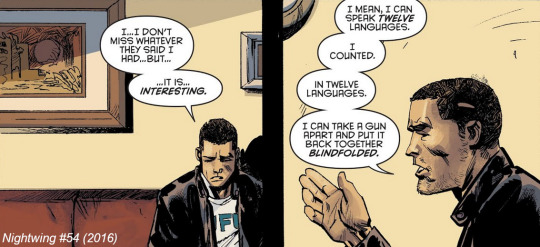
Starting off with The Essential Batman Encyclopedia, the entry for Dick Grayson lists him as being trained in French, Spanish, Russian, Japanese, Mandarin, and Cantonese with having some proficiency in an unknown Romani dialect. Given there are multiple examples of him speaking these languages throughout the comics, I am inclined to trust this claim. To start, we've got several examples of French (Gotham Knights #14, Detective Comics Annual #12, Nightwing #73, Grayson #10-- also featuring Spanish)
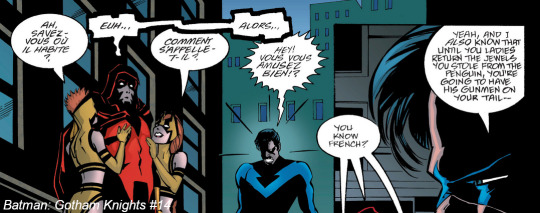
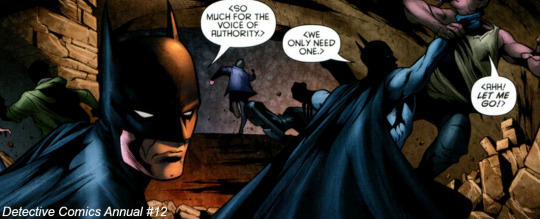
In Grayson #1 he speaks Russian only briefly, but in Detective Comics #36 he speaks it throughout.
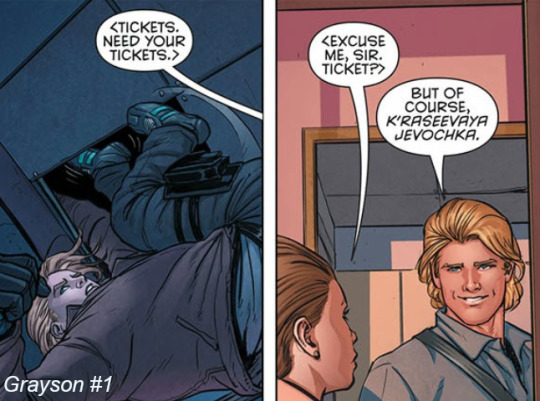
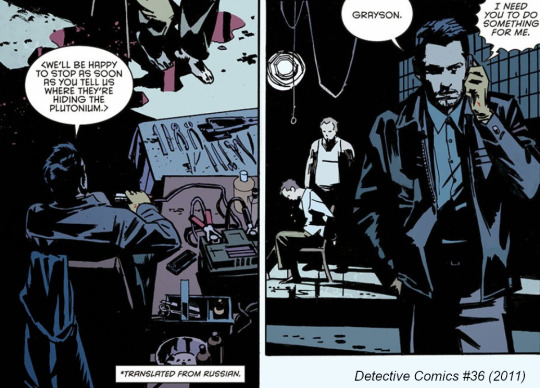
As far as the Chinese languages go, while I believe Dick can speak Mandarin and/or Cantonese fairly well (Batman/Superman World's Finest #3), his Hanzi recognition and literacy could use some work.
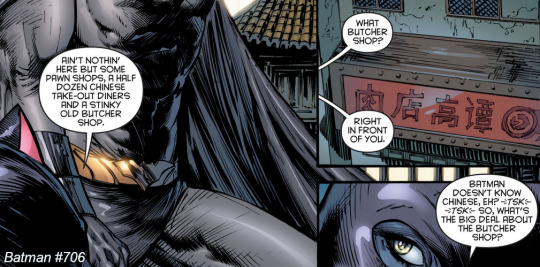
Similarly, when the Titans head off to Japan in Titans Annual #1, we have Nightwing speaking Japanese in battle; however, when it comes to the prospective job of being a manga translator in Nightwing #125, he claims he doesn't know Japanese, which leads me to believe he is only proficient in speaking Japanese/Chinese and struggles with the writing systems.

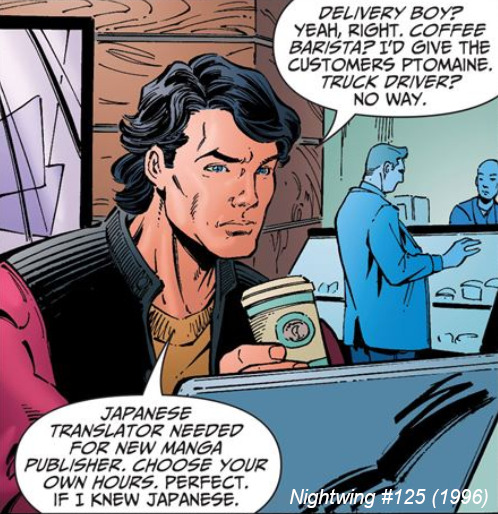
So what about the languages not covered in the encyclopedia? To start, we have another romance language: Italian (Nightwing #72).
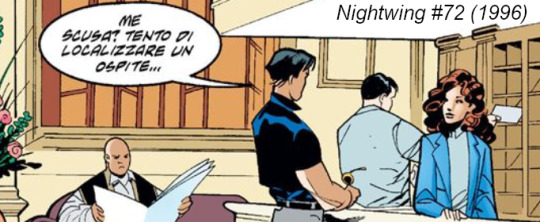
Followed by some alleged German (Nightwing #51, JLA #44)
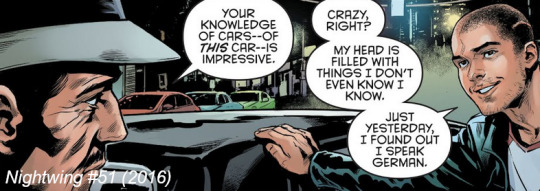
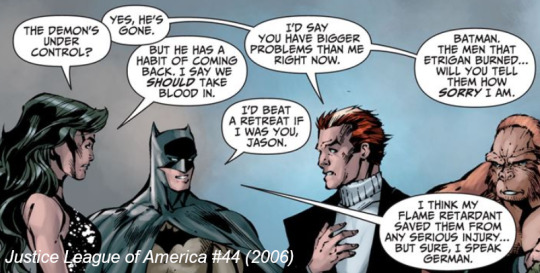
And conversations in Farsi (Robin #175)

While I've seen some Tumblr and Reddit posts claim he knows Kikuyu, The Power Company: Manhunter #1 only says he "brushed up" on his Kikuyu before going to Kenya, so it is unknown how much of the language he actually speaks, but to me it doesn't seem likely to be a lot.

He also, to some unknown degree, speaks Tamaranean-- at least enough to hack into an alien computer (Action Comics #842).
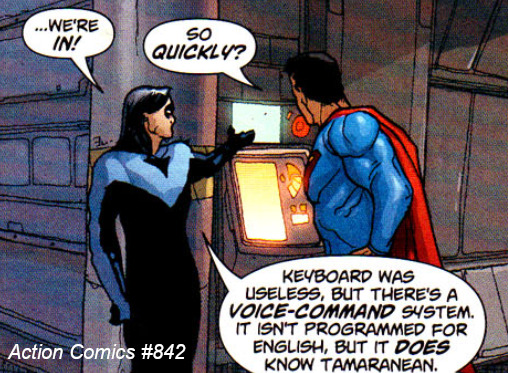
As far as unspoken languages go, Dick is fluent in ASL, which is proven numerous times when he communicates with Jericho (New Teen Titans 1984).

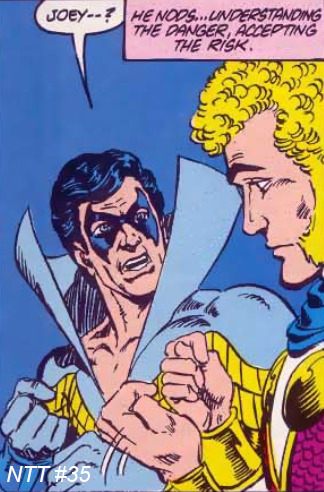
And lastly, the two languages that remain rather uncertain are Romani and Cant-- largely due to the nature of the languages themselves and their representation in comics. "Romani," for instance, has several different dialects, and when Devin Grayson introduced it for Dick (Gotham Knights #20-21, Nightwing #91), she never specified which, and based on the lines she wrote, her research into the language was questionable at best. Writers since have recognized Dick's Romani heritage, but have not otherwise suggested he retained much of the language to be considered fluent.
Cant is an even wider term than Romani and can be seen as more of jargon for a particular language than a language itself, sometimes even being called a "pseudo-language." The colloquial term for American circus cant is Carny, or "Carny speak" as Boston Brand puts it in Batman: The Brave and the Bold #14 when he and Nightwing encounter a kid who speaks it.
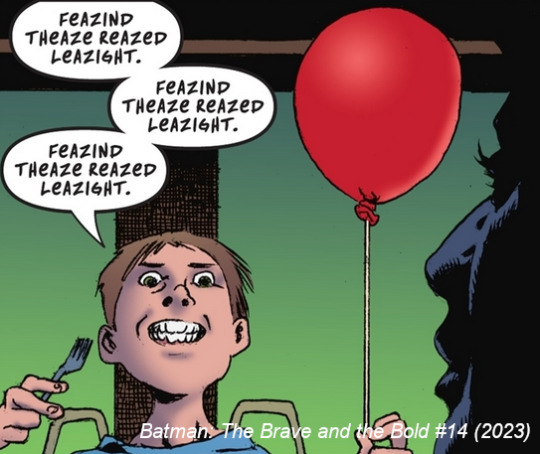
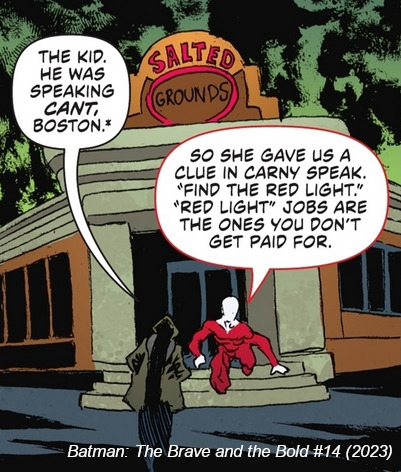
So... this leaves us with 11 languages Dick has notable proficiency in: English, French, Spanish, Italian, Russian, German, Japanese, Mandarin, Cantonese, Farsi, and ASL. And ~3 languages he has unknown proficiency in: Tamaranean, Kikuyu, Romani, and Carny/Cant (if you want to count it).
Maybe memory-loss Dick was including either Tamaranean or Kikuyu in that count from Nightwing #54, or maybe he knows some other language we haven't seen yet. Given how close the family is to the Al Ghuls, I personally think it would be cool if one of them was Arabic.
But anyway, hope you enjoyed this post! A lot I've seen covering this topic are very surface-level and label some of his more iffy languages as "fluent," so I hope this cleared things up. I've read tons of Nightwing, and I swear there are more examples, but sifting through the 1,000+ comics I've read of him is a lot haha. If y'all know of some others, let me know!
#nightwing#dick grayson#romani dick grayson#boy wonder#first robin#language#polyglot character#multilingual character#dc comics#i tried to keep the romani and carny part brief#you could write a whole essay on the languages#i could also write a whole essay on devin grayson's romani rep#or lack thereof#and its problematic nature#but that's a post for another day
251 notes
·
View notes
Text
sirius really spent 12 years in solitary confinement with nothing but dementors for company, only to be locked up in his abusive childhood home for a year, and then murdered by his own cousin the one time he left it to protect harry.
it’s no wonder that sirius was such a healthier parental figure to harry during goblet of fire. he may have been alone and on the run, he may have been forced to live in a cave and to eat rats, but at least he was free.
#I could write an essay on sirius’s deterioration from gof to ootp#and how useless he felt once he was locked up again#but that’s for another post#sirius black#padfoot#the noble and most ancient house of black#hjp#goblet of fire#the order of the phoenix#marauders#marauders era#harry potter#hp
285 notes
·
View notes
Text
Something I really like about Raph and Leo’s relationship is that Raph noticeably doesn’t hold back with Leo nearly as much as he does with Donnie and Mikey, and it’s really nice to see that from him.
Leo too would frequently fall into a natural strategist and second-in-command role of sorts, often actually giving his worries and thoughts to Raph where he wouldn’t normally.
Then the Shredder happens and this dynamic is thrown into a loop where they both stay solidly in their own camps of “we’re heroes, it’s our duty” and “we’re teens, who cares?” And during this, Raph not holding back from Leo is cranked up to an eleven and Leo flips around to mask more with Raph than he ever had before and deliberately riles Raph up so that fights are all but guaranteed.
Post-invasion, it’s clear they’re (mostly) back to how they were before for the most part, with an added level of respect and maturity (and trauma) there too, and it’s great to see because they’re an amazing duo when they’re on the same wavelength.
#rottmnt#rise of the teenage mutant ninja turtles#rottmnt raph#rottmnt leo#I love their dynamic a lot actually#it is funny to see Raph be all ‘hey buddy ☺️’ sometimes to Donnie and Mikey but Leo he’s like nah it’s on sight#and Leo for his part is like okay we should probably not trust the spider lady right Raph? RIGHT Raph??#they work really really well together tbh and cover each others weak points amazingly#strong and defensive Raph and quick and strategic Leo#lethal combo#I could say more but that essay is for another time#codependency mention below /#okay but *eyes my post-invasion codependent Raph & Leo idea because the movie could so easily lead to that*
352 notes
·
View notes
Text
this might be controversial, but man am i becoming increasingly convinced that buddie trutherism* is just not (and probably never has been) a very healthy way to engage with this show. *to be clear, by this i don't mean shipping buddie, or hoping it'll be canon, or thinking that it could be, i mean the completely unshakeable belief that it is absolutely going to happen (and to a lesser extent that it's always been the plan).
every single piece of evidence for buddie is evidence of a potential, often very compelling potential, but there is really nothing to suggest some big six season plan or any plan at all.
i'm sure a lot of these ppl (maybe even most) aren't bad, or doing anything out of malice. however, i do think having a large chunk of the fandom make post after post, week after week, season after season going "don't worry guys, buddie's definitely happening because of x, y or z," has helped create the current environment. where ppl have spent so long in a bubble where buddie's been presented as the only reasonable outcome, that they can't conceive of the idea they might've been wrong.
atp a lot of buddie meta isn't a queer reading of the show/relationship it's just straight up lies. no tommy isn't a miserable hater who never smiles at his bf, nor is he a predatory freak preying on sweet baby bi buck, and no eddie wasn't jealous at the wedding, no buck didn't realise he was in love with eddie when he came out to him. truly, after a decade in different fandoms, I don't think i've ever seen shipping goggles this bad.
again i don't think the ppl making meta/analysis about things that genuinely have some queer subtext to them are bad or doing anything wrong. but, when a narrative that you're contributing to is feeding into this much wider ecosystem that's influencing others to harass ppl and peddle homophobic dog whistles in an attempt to bridge the gap between their fanon and canon, at what point do you step back and go, "you know what, i don't think it's responsible for me to feed into this anymore."
and i worry that even the people who aren't hurting others with this kind of engagement, are gonna end up hurting themselves in the long run.
#ngl until s7 i sort of thought we were all just having fun#like when i'd see essay length metas about buck and eddie's shirt colours or w/e i thought that was just for the love of it#i didn't realise some of y'all thought the writers were actually leaving hidden messages in the fridge magnets#this was sitting in my drafts and i wasn't gonna post it but then the daddy issues discourse hit and my god has it worn my patience thin#ftr this is why y'all will never see another piece of gay eddie spec from me ever again. it feels like adding fuel to a fire atp#911 abc#911 discourse#anti buddie#antibuddie#bucktommy#911 spoilers#lmfao apparently this was my 3000th post
233 notes
·
View notes
Text

mezalean smalletho won’t leave my brain
closeups


and also extra doodles because i’m going to goinsane

#my art#smallishbeans fanart#ethoslab fanart#life series au#empires smp#empires au#trafficshipping#i’m stuck in a boat help me#imso deep in smalletho hell you have no idea#i love mezalea so much you have no idea#i have so many smalletho doodles you have no idea#i could write an essay about life series joel i could write an essay about life series etho i could write an essay I COULD WRITE AN ESSAY.#the shame is i have been able to rant about my boat boy hyperfixation to exactly 0 people#damn you social anxiety. damn you#if you couldn’t tell i suck at outfit design. yet another thing i must work on#smalletho#forgot that one#somehow#oughehrgjsoxuhdgh#i lied last time apparently im still getting anxiety#im posting this now before i die okay goodbye
145 notes
·
View notes
Text
The Authoritarianism of "Father's" Celestial Realm (NB Season 2)
OKAY, life got crazy for a while, but we're finally all caught up on Nightbringer's main story, and PHEW we've got some things to talk about. So let's dive right in, starting with one of our favorite topics:
God and the Celestial Realm actually kinda suck in the OM universe!!!
(spoilers up to NB lesson 38!)
Now, this been a consistent pattern for most of OM's story and lore, but we're going to be focusing here mostly on Lessons 37 and 38 in particular this time, because they had a lot to talk about in that regard.
In Lesson 37, we are introduced to the underworld, specifically Cocytus at the very bottom layer of it.
One interesting note, however, is that this region is territory of the Celestial Realm, despite it being geographically in the Devildom, and the Celestial Realm is the one that doles out punishments relating to it -- usually. We'll dive more into that whole conspiracy in another post, but it's certainly an interesting geopolitical fact of the Three Realms.
As for the underworld itself, the idea of multiple layers of hell is a common one which originates from Dante's Inferno, the first section of the Divine Comedy, and we see that Cocytus here is taken pretty directly from that as well. Just like Dante describes in the Divine Comedy, Simeon informs us that there are four regions that make up Cocytus, made up of four concentric circles of growing intensity according to their corresponding offenses. Specifically, each layer of Cocytus is related to a type of betrayal: of family, of homeland, of guests, and finally, as the very worst type of betrayal, of "him".
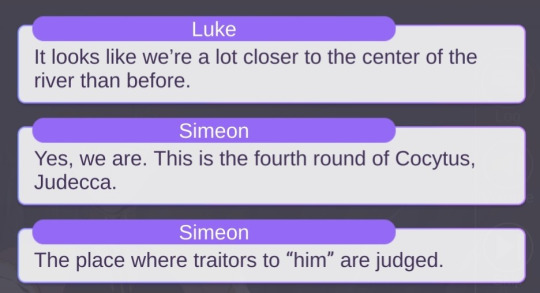
The design of that is immediately very telling about how the Celestial Realm views these offenses. Other offenses may land a person in the underworld in general, but these specific types of betrayal are the worst. And among those worsts, betraying God is the ultimate offense, absolutely beyond anything else one could ever do.
Now, these levels of Cocytus almost directly match Dante's Inferno take on them -- with one major, interesting distinction. In the Divine Comedy, Judecca is for "traitors to masters and benefactors." In OM, it is traitors to "him." Considering that the rest of the levels are a direct match, this suggests that, in OM, their father is the master who must never be betrayed.
And as Mammon notes, that's exactly what our beloved demon brothers did, with Lucifer in the lead.
That brings us to the present situation, with Lucifer chained and suffering at the very center of the bottom of the underworld. The worst of the worst offenders.
Simeon, Luke, and MC arrive to find Lucifer in a screaming rage, noting that same fact. Lucifer is in such pain and rage that he's creating dangerously massive gusts of wind, and as he worries about MC and then his brothers, it only gets worse. Suddenly, Raphael appears to read Lucifer his charges. And then, we get this conversation:
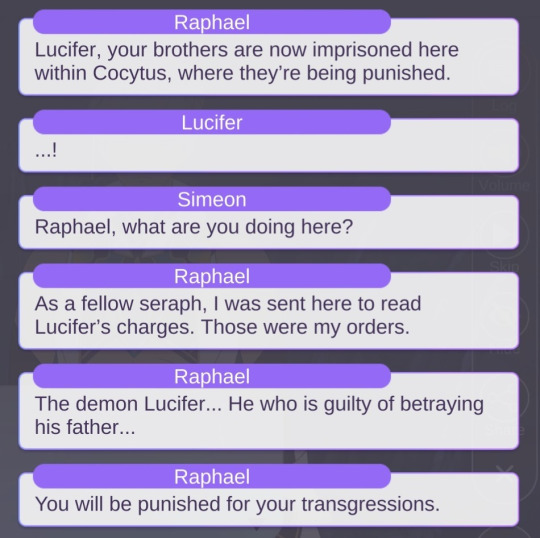
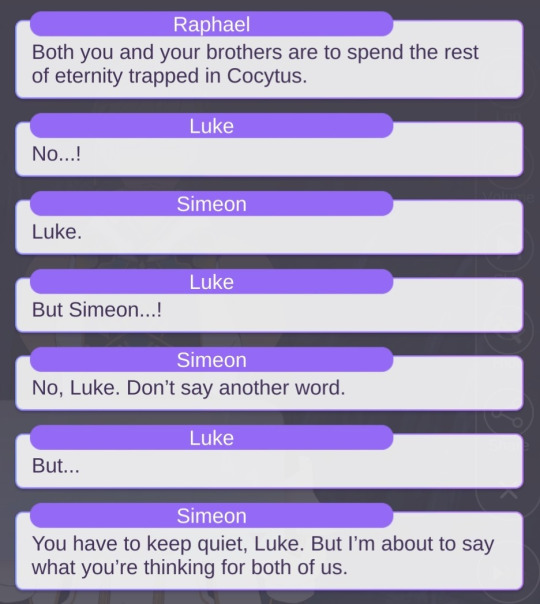
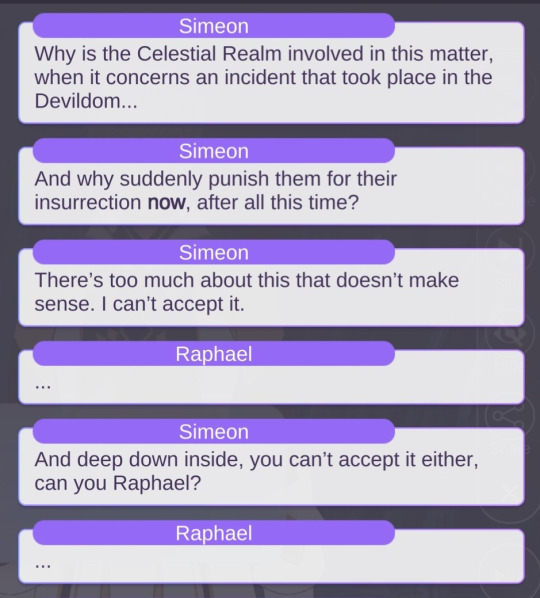
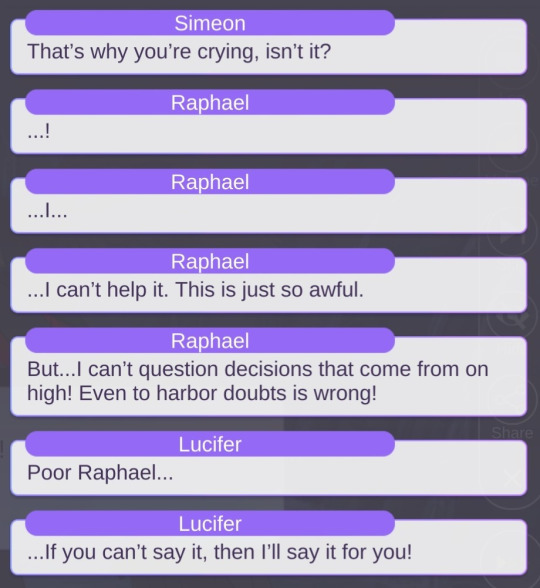
There's a lot going on there, but to go piece by piece, Luke is obviously distraught upon hearing the brothers' decreed fate. He wants to protest it and argue against it. Simeon stops him because Luke absolutely must not say another word -- as a reminder, arguing against Lilith's punishment was the catalyst for the whole rebellion that ensued, which is the entire reason Lucifer is being punished like this now!
Simeon, however, has recently been demoted. We know he was a seraph at the time of the rebellion; the official Nightbringer website specifies that he was demoted for "covering for" the brothers, though we don't know the specifics of what happened there. Simeon has always been a little daring on speaking truth to power, and considering he's already been demoted, it seems he's willing to take the potential consequence of speaking up again here. So he does, expressing his questions and concerns about the whole situation going on. And, finally, he calls out Raphael on also feeling the same as he and Luke both do.
It is perhaps the most telling moment we've gotten to date of how Raphael has felt about this whole civil war between the angels. In the past, he's been fairly consistently strict about the Celestial Realm's rules, which essentially boil down to always obeying their father, and Michael by extension. And he holds himself to basically the same standards, obediently doing whatever Michael tells him to even as he's disgruntled or frustrated by the myriad requests. But when it comes to seeing Lucifer punished this way, he can't accept it either. It's wrong, and he knows it.
But he can't question decisions that come from on high. Even doubting is considered wrong.
We've heard the same from Lucifer once before -- that he questioned one who was never to be questioned. That is what he has been punished for.

This is the reason Luke must not speak up. This is the reason Raphael is crying. And it's the reason for Lucifer's current punishment. Simeon, Lucifer, and Raphael all know it implicitly -- what comes from on high is absolute. Questioning is unacceptable. Doubts are unacceptable. And rebellion is unacceptable -- the absolute worst thing that someone can do.
Anyway, now throw all that out though, because apparently Lesson 38 wants to attempt to bring us to a completely different conclusion!

Let's be honest here -- OM is a bit jumpy on its writing sometimes, and sometimes makes wild left turns. But we ended Lesson 37 feeling pretty excited because it's revisiting a common theme we've had hinted at throughout both games about what kind of leader their father is and what kind of place the Celestial Realm really is under him. And what we've seen, generally, is this: it is a very strict place, unforgiving of those who step out of line, where their father's word is absolute, and even feeling doubt is a grave offense. We even know that Simeon's greatest fear is their father!
So imagine our shock and disappointment when Lesson 38 suddenly decides that, no, actually, this punishment and everything else is actually God's love for them. What?!
New theory: exactly one person on OM's writing team is actually super religious and keeps trying to make this game about dating demons into a message that God is good. These lessons were not written by the same person.
Lesson 38 starts with a rather chaotic scene -- Lucifer has broken free of his chains and is lashing out in rage and despair, not thinking straight. Diavolo makes his appearance and tries to subdue Lucifer, though the two end up going into an all-out brawl as Lucifer lashes out at Diavolo as well. MC eventually intervenes and the brothers show up to protect MC from both Lucifer's and Diavolo's attacks. Lucifer is taken aback seeing that his brothers are all okay and present in front of him, and as MC approaches him to further calm him down, the Ring of Light glows and Lucifer momentarily transforms into his angel form, inspiring awe from everyone around at the sight of the Morning Star once more.
Earlier, Lucifer was begging to be shown some kind of sign from his father, of what it was that he wanted from him. Simeon comments that this might be Father answering that call for a sign -- a sign of his love. Lucifer seems to accept this, though with some bewilderment. But we have Lucifer straight up tell MC later in the lesson that he "must have forgotten" that Father loved them all along! That all he ever did was give, and never ask for anything in return!
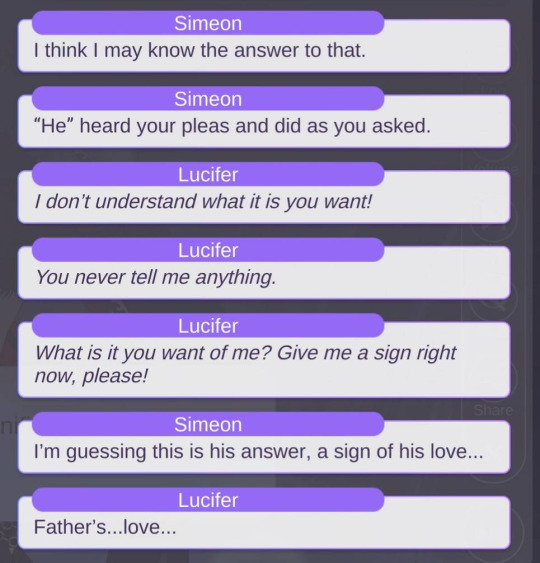
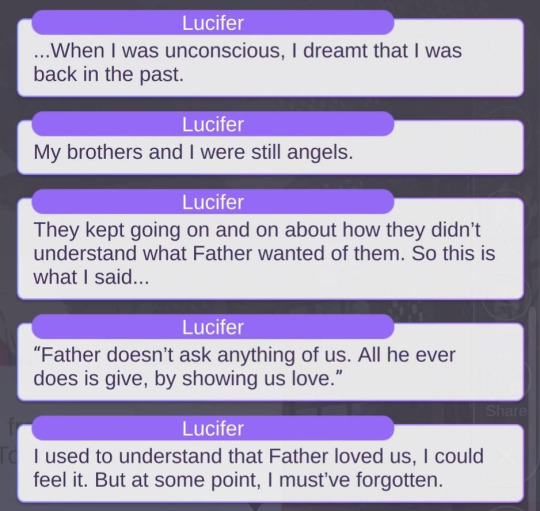
Except for blind, unwavering loyalty. Something that Lucifer has actually forgotten about in this moment.
For that matter, why does Simeon automatically assume it's this grand sign of their father's love?! He himself just stated his own doubts and called Raphael out on his.
It's a huge 180 that gave us some intense whiplash for sure. But this isn't the first time we've seen that more religious trauma view from Simeon; we've seen it before in OG season 4, where he has obviously been deeply affected by being demoted out of being an angel altogether but tries to reassure himself that their father does everything for a reason, "even this."
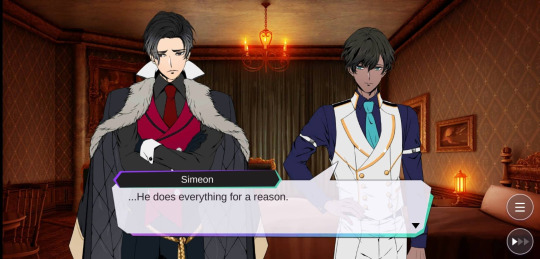
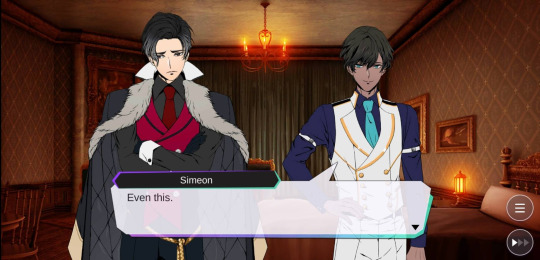
However, even aside from the very sudden turnaround, this explanation leaves a lot to be desired, because it doesn't actually answer anything!!!
We just got told that Raphael was crying from the cognitive dissonance of obeying orders to read the charges against Lucifer while feeling deep down in his heart of hearts that this is wrong. Luke has been stopped from saying anything that could be construed as going against their father! Even harboring doubts is wrong, but somehow we are supposed to suddenly believe that it's because their father loves them?
If that's God's love, it's sure sounding like God is an abusive helicopter parent, because that's not a healthy loving relationship.
Think about it -- this is a scene of punishment. Lucifer isn't just chilling down here for fun; he is actively in pain when we find him, and it only escalates his torment at the thought that his brothers are being punished similarly. And even as we are told that Little D. No. 1 couldn't take material form because their father "just loved them so much," is it really a healthy form of so-called love to hold on to a piece of Lucifer's soul without his knowledge, even after casting him out?! We wouldn't say that a parent who throws their own child out to be homeless while keeping their old room intact is a good, loving parent; why should we think this is any different?
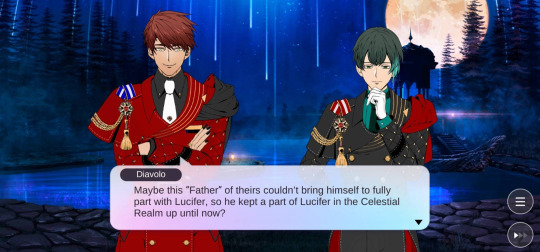
Plus, this is the case for Lucifer -- but what about the other brothers? Though they all managed to get free, Cocytus itself seemed prepared to punish each of them for their various transgressions, and as Mammon points out, all of them were guilty of treason against their father. Yet, it's only Lucifer whose Little D. was never able to take form. It is Lucifer specifically who is targeted for this Cocytus punishment, and the others would likely have been left alone if not for the fact that they came to save him. Lucifer is the one who, for that one moment, regains his angel form.
And what does this mean, if this is God letting go of the last of his grip on Lucifer? That he still loved his favorite son but is casting him away for real now? We know Lucifer has said that God would never forgive him in particular, and though he's been accused of just being stubborn himself (and make no mistake, Lucifer certainly is also stubborn too), it does seem in line with everything else we've been shown about their father. Does this mean that their father no longer loves Lucifer, from this specific point onwards?
And, if their father loves them so much -- then why did they need to rebel for Lilith's sake? The implication here is truly bizarre: their father was going to obliterate Lilith entirely from all existence so that not even her soul would remain, but he also just loves Lucifer so much, but is also so authoritarian that Lucifer trying to talk it out with him was met with a complete shutdown so that Lucifer felt he had no other choice but to start the war. Of course, conveniently, this lesson also just chooses to completely disregard the whole Lilith thing, both her existence at all alongside the brothers before the war and her punishment, so apparently none of that matters!

It's completely out of line with the rest of everything we've ever really been told about the Celestial Realm, and frankly, we don't like or accept it. This so-called love that's suddenly used as the explanation in Lesson 38 isn't a true or healthy kind of love, and we don't want it.
So in conclusion: God is gaslighting us but he really does totally actually suck. We're just supposed to suddenly believe now, out of nowhere, that he doesn't. But he definitely, really does.
Anyway so, Lesson 37 is 10/10 and 38 is -10/10, would not read again. Merry Crisis!
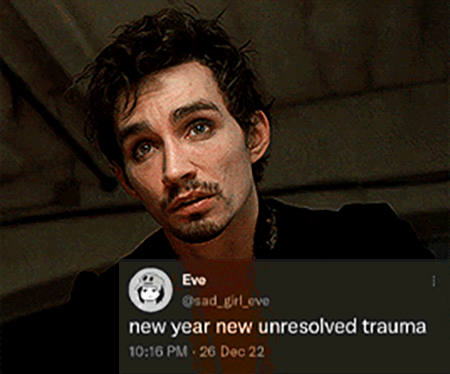
#is this too spicy to post on xmas? sorry not sorry#enjoy yet another long essay from us#obey me#obey me!#obey me swd#obey me shall we date#omswd#obey me nightbringer#obey me nightbringer spoilers#omnb#obey me analysis#obey me lucifer#obey me celestial realm#obey me raphael#obey me simeon#always ready to fight god#obey me nb lesson 37#obey me nb lesson 38
327 notes
·
View notes
Text
Right lads I’m gonna sit you all down so we can all have a fun little chat about ✨the lighting in the captain’s flashbacks✨
Have a look at these screenshots from redding weddy and carpe diem, these take place during the day. Notice how the lighting is very warm; there’s golds and browns and you can feel the sun coming through the windows


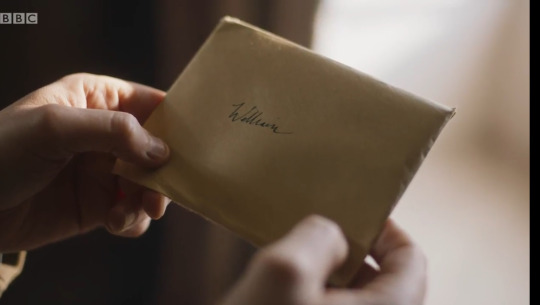
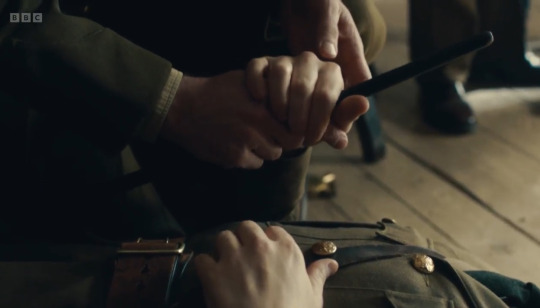

Now take a gander at these screenshots from redding weddy, they take place during nighttime and the lighting is very cool. Blues and dark greens and blacks, you can feel the bitter chill in the night air
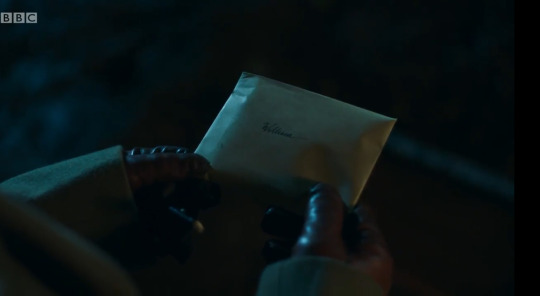
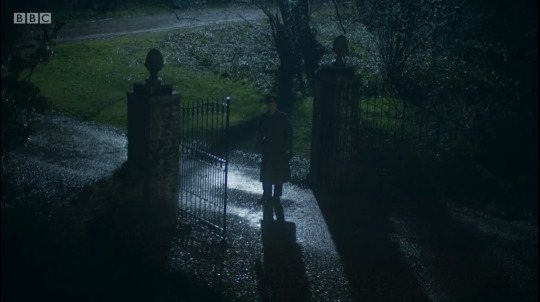
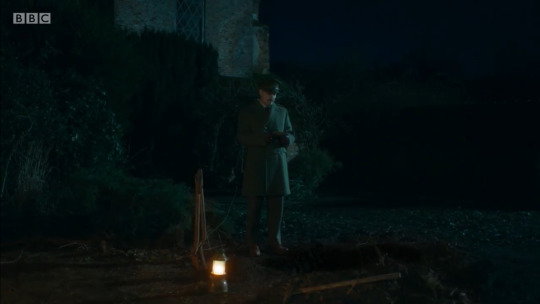
There’s another difference between these two scenes: in the warmer ones, havers is present, and in the cooler ones, havers is gone. Havers quite literally brightens the captain’s life, this is regardless of whatever is happening. In cap’s death scene, the lighting is warm despite the tragic circumstances. When havers tells cap he’s leaving, the lighting is still warm. Any kind of heartbreak the captain feels is eased by havers’ presence, even if he is the source of that heartbreak.
I would also like to note the parallels between these two shots (this fucking window oh my god)


When we first see cap sitting here in redding weddy, he is reliving the memory of havers leaving, the music crescendos as the beloved lieutenant disappears through the gate. Because the scene focuses on havers leaving, the lighting is cool. When we revisit it in carpe diem, cap is reflecting on his death. The main focus of the minor flashback isn’t havers but it highlights a scene where havers is present (the one with the general guy) Thus, the lighting is warm.
Uhhhhh anyways that’s all I have to say about this lol, idk who’s creative decision it was to do this but they deserve a million dollars and I want to give them my hand in marriage
#AKDJSKHFAKHDAKJFKSJFKDHFJSAKJDKSHDKSHDKSJDKKDHFKSJDLSJFLAKLDKDSLFJLFKSUDKK#I LOVE YOU LIGHT/DARK DYNAMIC I WANT TO KISS YOU PASSIONATELY!!!!!!!#bbc ghosts#the captain#lieutenant havers#capvers#long post#kinda#this is another one of my captain essays
274 notes
·
View notes
Text
Hawkeye and Frank are the two most diametrically opposed characters on Mash. They clash politically, ideologically, emotionally, intellectually, and even physically on more than one occasion. There is virtually nothing they agree on. But they do have one significant similarity: both Hawkeye and Frank are notably, pointedly effeminate.
Hawkeye is the central protagonist, so he's written to be likeable, even admirable, especially in the first five seasons of the show when satire dominated rather than character drama. He's the character who makes the correct political points and voices the show's ideology, and male audience members are encouraged to identify with him and aspire to be like him. He's witty, he's smart, he's charismatic, he dodges consequences a lot, he's highly skilled in his work, and he has a strong personality and natural leadership qualities.
Frank is the main antagonist up until the end of season five. He's written for audiences to hate him, mock him, and occasionally be horrified by him. He's dull-witted, incompetent, awkward, easily led and manipulated, and always gets his comeuppance. Few audience members are likely to aspire to be more like Frank Burns.
And yet, while most likeable protagonist/detestable antagonist duos in American popular media would also be differentiated in terms of gender performance as a matter of course - the effeminate villain being a standard stock character, always set against a ruggedly masculine hero - Mash takes a different approach.
From his core personality as a sniveling, weak-willed follower, to the way other characters, including Hawkeye, routinely make fun of him by comparing him to a woman or insinuating that he's gay, Frank Burns certainly fits the part of weak, emasculated villain. What's more interesting, and much less commonly seen in Hollywood media, is that Hawkeye is portrayed as just as unmanly, and just as, if not more prone to having it pointed out in the show.
Often Hawkeye's jokes at Frank's expense include the implication that Hawkeye is attracted to him himself, and not necessarily as "the man." He jokes, "Guess it's a marriage, Frank. I know I can do better, but at my age, can I wait?" in Hawkeye, Get Your Gun; he switches from calling Frank one of his vampire brides to taking the feminine part in post-coital pillow talk after siphoning his blood in Germ Warfare; he kisses or tells Frank to kiss him in Major Fred C. Dobbs, For the Good of the Outfit, and Bulletin Board, etc.
Other times, the jokes Hawkeye makes about himself are virtually identical to the jokes made at Frank's expense - their respective attractions to Margaret as a potentially dominant sexual partner, eg, with both Frank and Hawkeye portrayed as eagerly submissive. For instance, in 5 O'Clock Charlie Hawkeye jokes about tying Frank to Margaret's tent, then dismisses the thought with, "He'd probably love it. I know I would." And Hawkeye/Trapper and Frank/Margaret are sometimes paralleled as dual couples, Hawkeye and Frank usually being framed as the more feminine partner in each.
And of course, unconnected to Frank, there are many, many more examples of Hawkeye's effeminacy, both in jokes and in personality traits.
Hawkeye is a self-professed coward who is loud and proud about how terrified he is to be stuck in a war zone. He's emotionally open and highly empathetic, always willing to listen to others' problems and discuss (or scream about) his own. He abhors institutional violence and faces every enemy combatant with his hands firmly in the air. When authority is thrust upon him he strives to relinquish it, and uses it as little as possible.
More shallowly, he has little interest in sports and exercise, derides masculine hobby magazines like Field and Stream and Popular Mechanics, is incapable of performing mechanical tasks to the exasperation of others at least four times (Comrades in Arms which explicitly frames this emasculating, In Love and War, Patent 4077, and Hey, Look Me Over), mocks traditional masculinity in many ways, and enjoys musical theatre and Hollywood gossip. And he makes and takes literally hundreds of jokes about being unmanly and having sex with men himself, many more than he makes at Frank's expense.
But while the jokes are at Frank's expense and meant to belittle him, they're rarely made at Hawkeye's expense, especially in the first five seasons. Hawkeye doesn't make the jokes out of self-deprecation, he makes them out of pride and a desire to differentiate himself from the army men he's surrounded by. He's almost always in on the jokes others make about him, rather than offended - Potter telling him to file a paternity suit against his rival in Hepatitis makes him laugh delightedly, and Trapper's remarks on his effeminacy, such as Miz Hawkeye in Hot Lips and Empty Arms, are sometimes lightly teasing but always a regular aspect of their dynamic that Hawkeye enjoys playing up. Frank doesn't make any jokes directly mocking Hawkeye's masculinity that I can recall, beyond vague "pervert" and "degenerate" remarks, which, while often historically homophobic, in the show's context tend to be treated as a reference to his heterosexual endeavours.
Frank's effeminacy is a point of mockery and derision, but Hawkeye's is a point of pride, and not intended to make him any less likeable to an audience. Antagonists don't get to score points off of Hawkeye by mocking his feminine traits, but Hawkeye makes fun of Frank regularly by mocking his feminine traits.
This difference in framing can partially be explained by the nature of their respective gender performances.
While Hawkeye and Frank are both effeminate, they're effeminate in many opposite ways. Frank is weak-willed while Hawkeye is strong-willed. Frank is unappealing to most women, while Hawkeye is something of a lady's man. Frank cannot face his fears to rise to a challenge, but Hawkeye can. But on the flipside, Frank refuses to admit to fear while Hawkeye openly proclaims it. Frank strives to attain authority while Hawkeye refuses it or takes it on only begrudgingly. Frank is obsessed with guns to a freudian extent while one of Hawkeye's most famous monologues of the show is a speech about refusing to carry one. Frank worships the concept of traditional masculinity even while he can't perform it himself, while Hawkeye mocks the concept and would refuse to perform it even if he could.
The Sniper is an excellent case study of these contrasts. In this episode, Hawkeye is effeminate and at ease with it, while Frank is desperate to prove himself masculine. Frank and Margaret flirt with strong Freudian overtones while Frank shoots a gun while nearby Hawkeye flirts with with a nurse with a line about "tasting" her. Hawkeye connects with the nurse he's wooing by relating to how scared she is and huddling in fear with her, while Margaret demands that Frank prove his masculinity by going out and taking down the sniper himself. Frank carries a gun while trying to approach the sniper, while Hawkeye carries a white flag. Frank tries to make fun of Hawkeye for wanting to surrender, but he can't bring himself to approach the sniper while Hawkeye does.
This contrast of gender performance is a consistent aspect of Hawkeye and Frank's dynamic throughout the show, but The Sniper makes it a central theme so it's a useful example to show how their relationships to masculinity are a deliberate aspect of their dynamic.
And while Hawkeye makes fun of Frank's femininity, it's significant that he also regularly makes fun of Frank's masculinity - his love of guns (eg The Sniper), his sexual affairs (eg the exchange about Frank as a "fantastic performer" in Yankee Doodle Doctor), his numerous attempts to exert authority (eg Welcome to Korea), his desire for socially approved success (eg Hot Lips and Empty Arms), etc.
Both masculine and feminine sides of Frank are comprised of negative character traits, while Hawkeye embodies the best of both - emotional expression and healthy ways of coping by talking about his feelings; bravery but not machismo; intelligence and skill as a doctor rather than an officer; empathy and a willingness to listen; sexual prowess but largely through his love of foreplay rather than his dick game (which, in the context of the early 70s, is a somewhat feminine attribute that distinguishes him from a typical traditionally masculine man); etc.
Hawkeye demonstrates some of the most appealing and healthy qualities of both masculinity and femininity while Frank demonstrates, or strives to demonstrate, the more toxic qualities of both. Through including a few positive masculine traits in the mix, the narrative is able to depict Hawkeye as likeable, admirable, and desirable in his effeminacy while Frank is depicted as loathesome in his. Hawkeye gets one of many, many women in The Sniper by showing vulnerability, while Frank only appeals to Margaret, and Margaret is portrayed as borderline pathological in her sexual attraction to violent masculinity (the scene where Frank excites her with his gun, for example, also includes an electra complex joke, and there's a running rape kink gag in this episode as well).
Another aspect to consider when it comes to differentiating Hawkeye and Frank's respective femininities is hypocrisy. Similar to how Frank and Margaret's affair is mocked because they can't admit to it while Hawkeye and Trapper's affairs are glorified, part of what makes Frank's effeminacy so mock-worthy, while Hawkeye's feminine qualities are a source of pride and rebellion, is that Frank refuses to admit to them.
Frank desperately wants to be the ideal heroic army man and often play-acts the part, poorly. When Hawkeye mocks him by calling him a woman, for example, he's drawing attention to Frank's failure to live up to his own ideals. And when Hawkeye calls himself a woman, he's mocking those same ideals. The message is that Frank is pathetic not so much for failing to be traditionally masculine, but for wanting to be traditionally masculine at all.
Ultimately the ways Hawkeye and Frank perform masculinity and femininity are pointedly in opposition, from which masc and fem traits they embody, to how proudly they embody them. The show itself draws attention to these gendered similarities and differences between Frank and Hawkeye through a constant barrage of jokes, and even whole scenes and episodes. In this way the show portrays Frank as a hypocritical loser who wants to be masculine but fails to embody all but the worst traits, and Hawkeye as a cool, admirable guy who disdains the traditional pillars of masculinity and embraces his own effeminacy.
#mash#marley on mash#mash gen#mash gs#frank mash#hawkeye mash#since you guys liked that trapper gender meta a lot more than i thought you would here have another one#though this is written a little less formally lol#i have more examples of whole scenes that make these comparisons than just the sniper but i'm trying to keep this from being#even longer than it already is#but eg white gold is another good example wrt how they relate to flagg; yankee doodle doctor; army navy game; george; the gun; etc etc#(also it's interesting that when frank leaves hawkeye gets the pathetic loser portrayal more often... though i think that's a coincidence#the shift from early to late mash could be yet another essay on mash and gender lol)#long post
273 notes
·
View notes
Text
i know part of why people don’t take adhd seriously is because of the stigma around it about us being all jokey jokey all the time & the infantilization that comes with that but. can i be real for a moment.
it is TRULY mind boggling to me that the worst most life-upending symptoms i experience only manifest themselves in a way that makes me feel like i’m living in an episode of seinfeld. that i’m playing sims on hard mode. that i’m that little character in deltarune being piloted around by a truly incomprehensible outside force of will i have no ability to reckon with.
like, ok. sure. my brain is only motivated to do things by power of “is it entertaining enough”.
it’s ridiculous. it does not matter how it is entertaining. as long as it’s interesting. so you cannot do ANYTHING that is boring. or you will simply die. (and often times that's not even enough either)
#adhd#text#neurodivergent#waughhh#god i have a lot of thoughts about the jokey jokey stigma thing i mention in passing. that i need to make another post on#but it keeps accidentally turning into a 10 page essay
1K notes
·
View notes